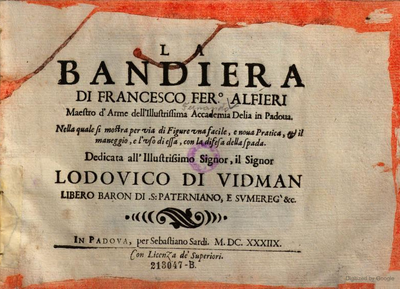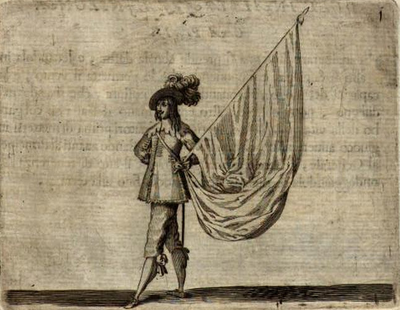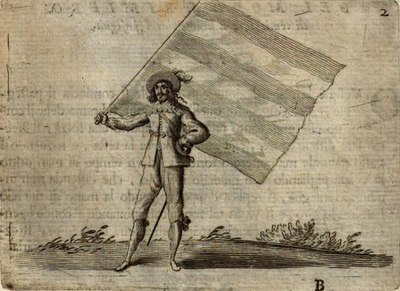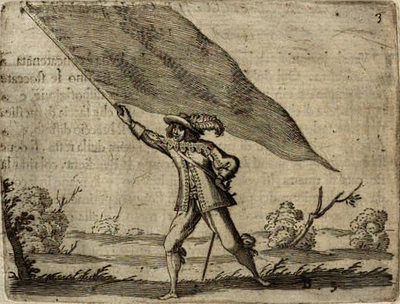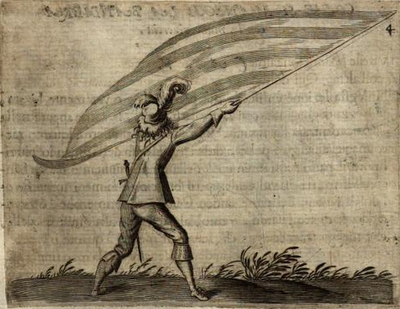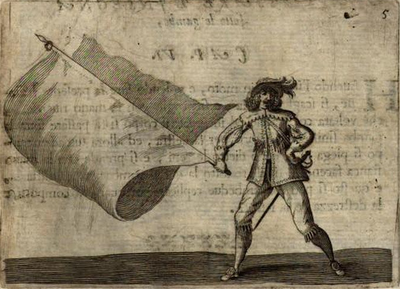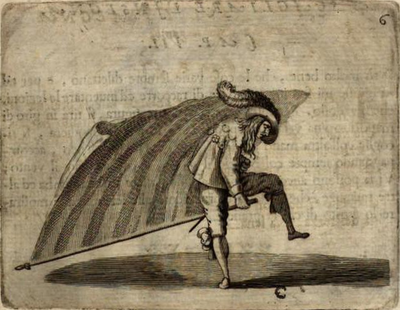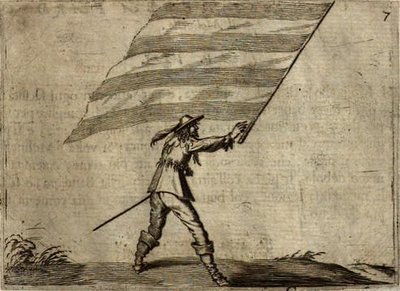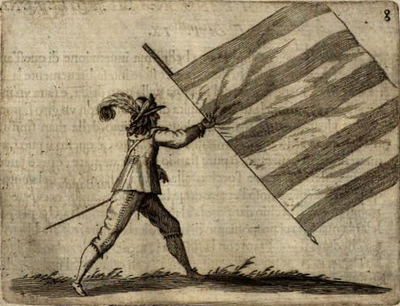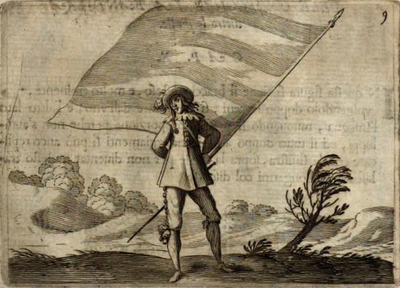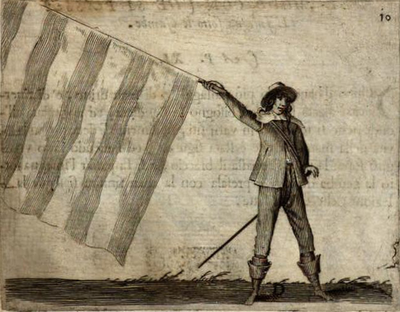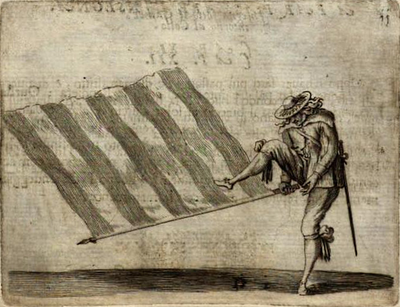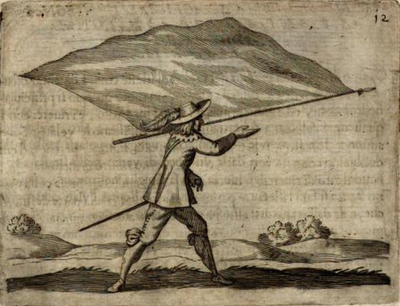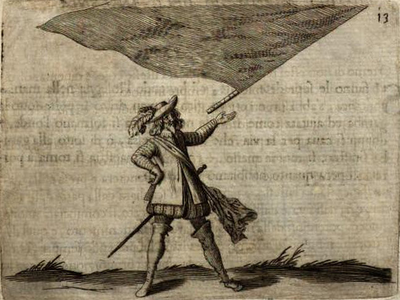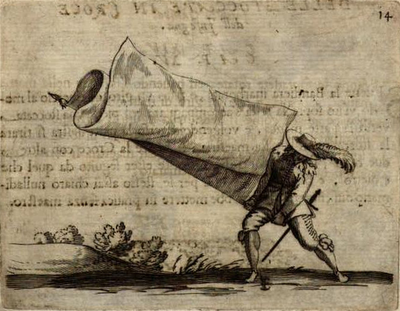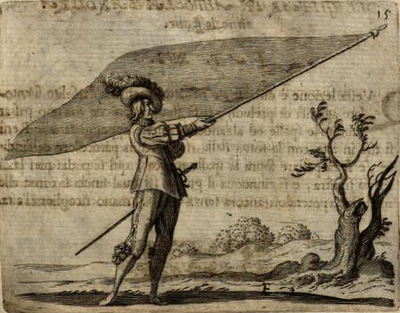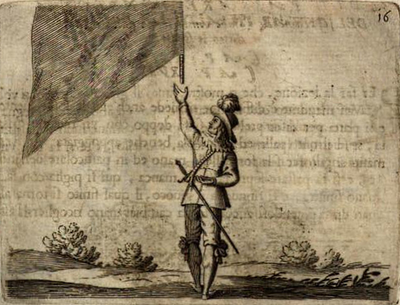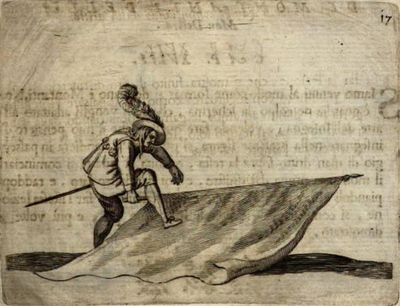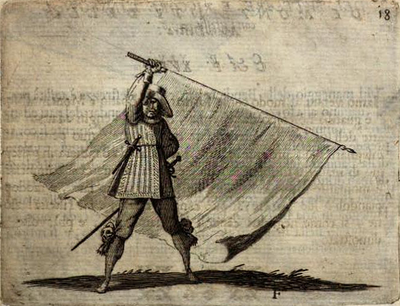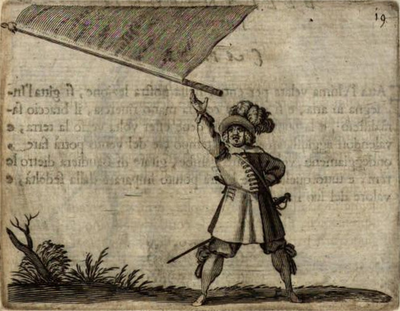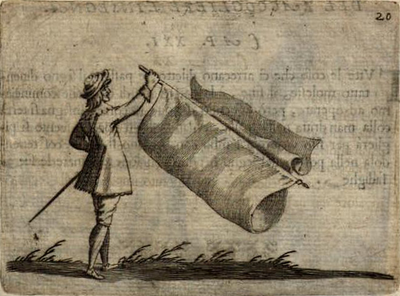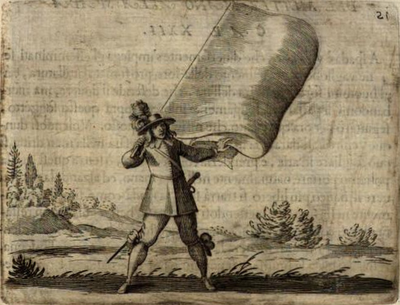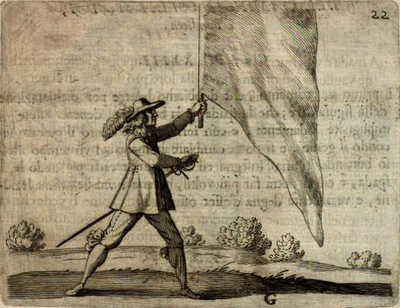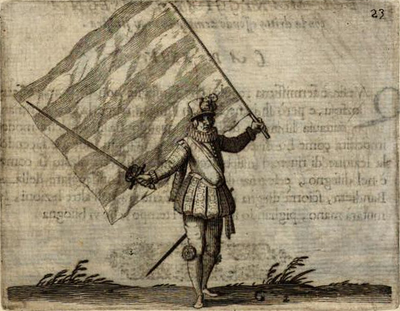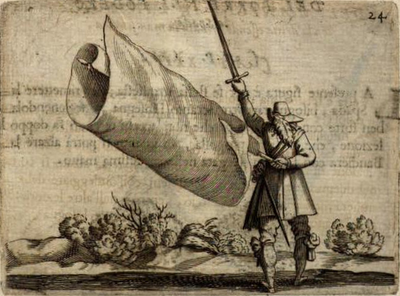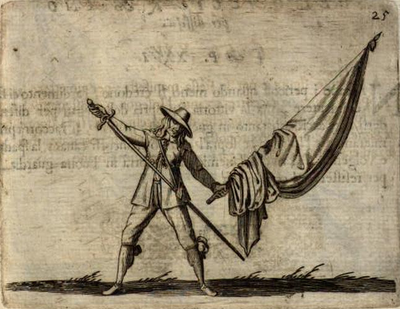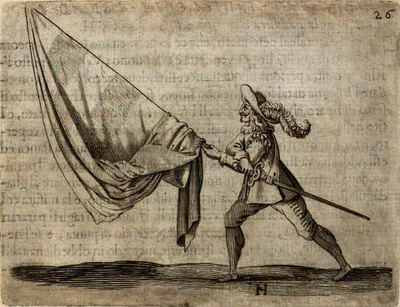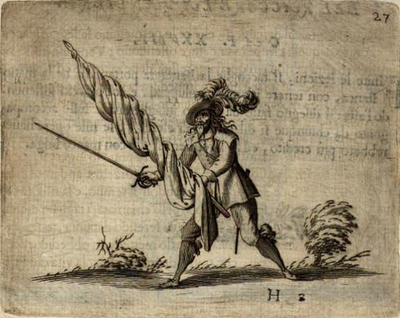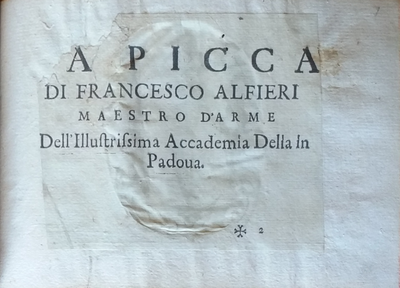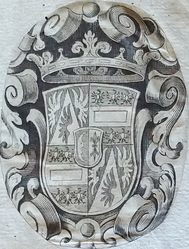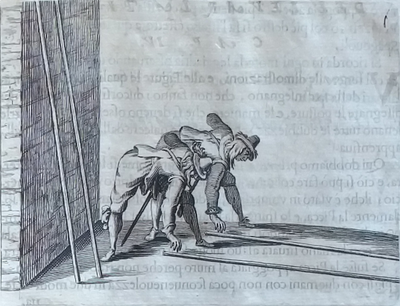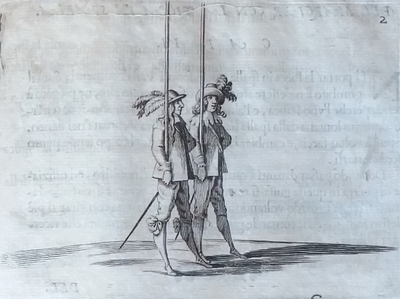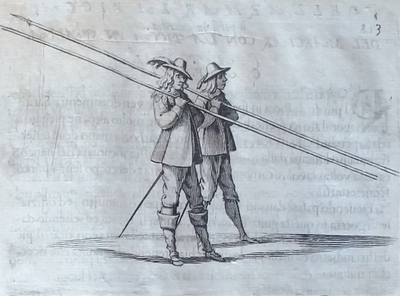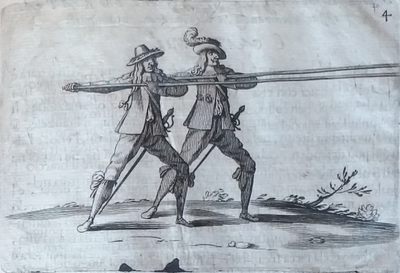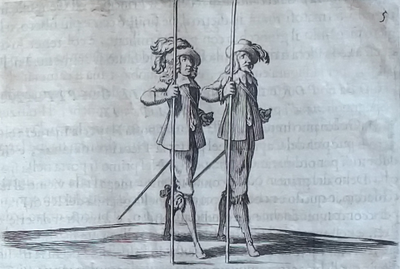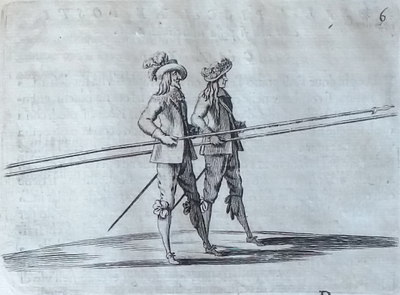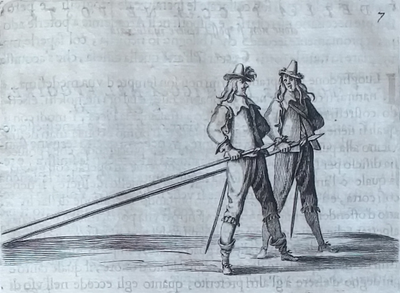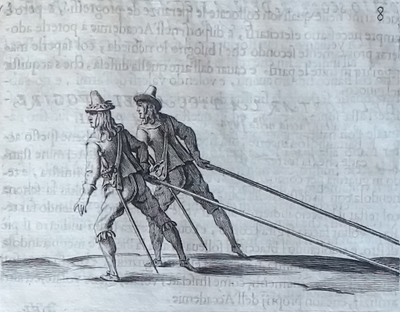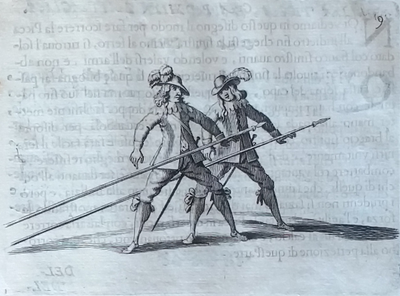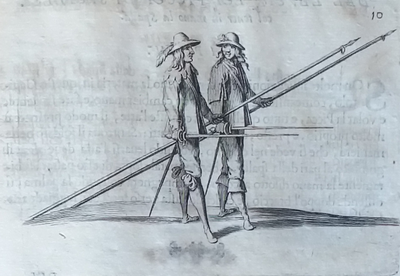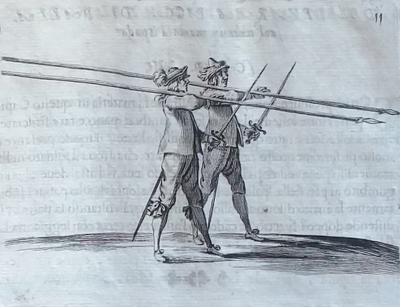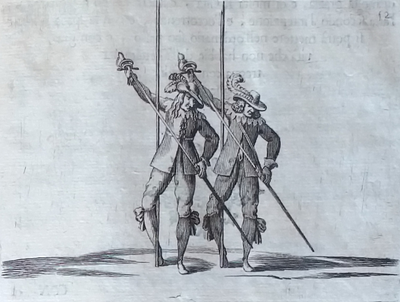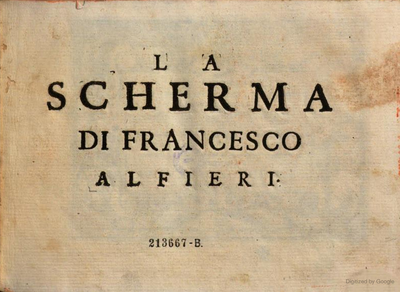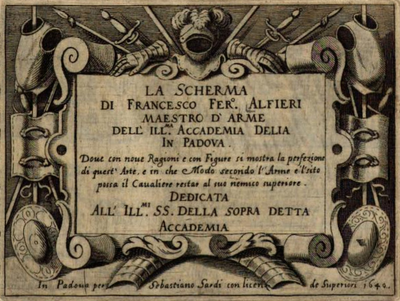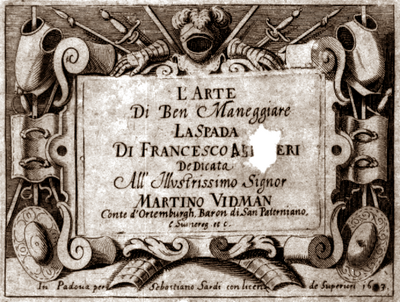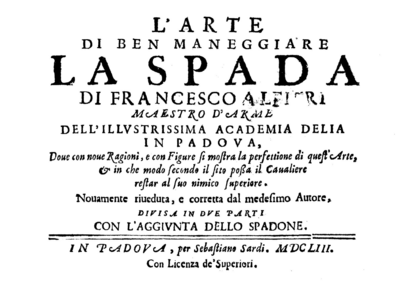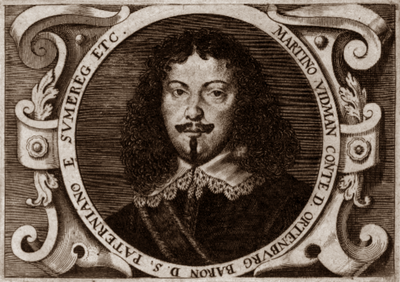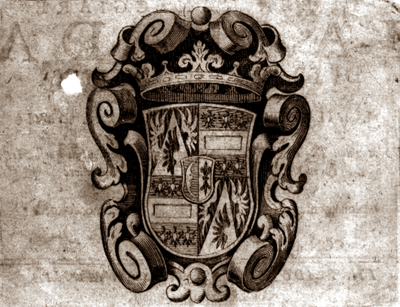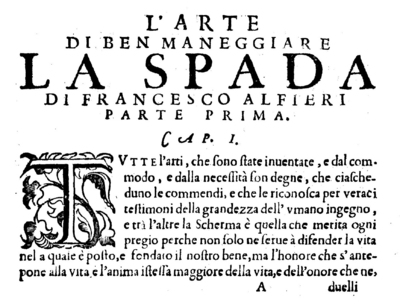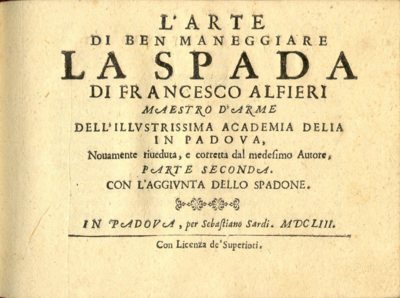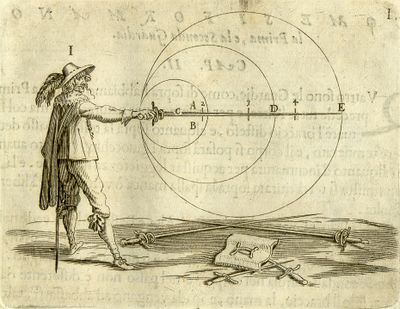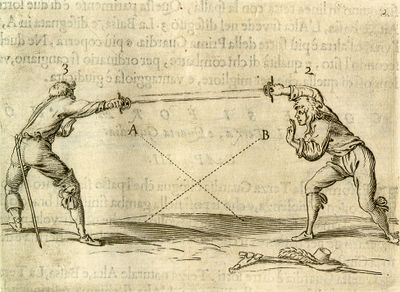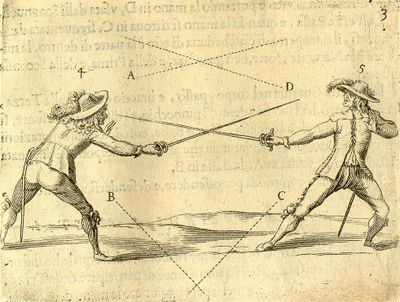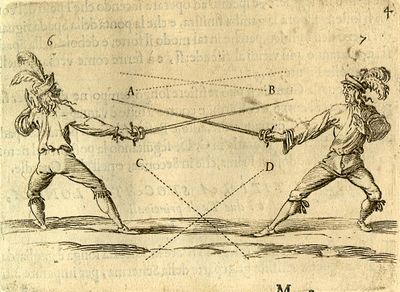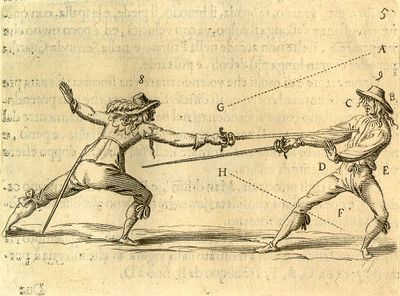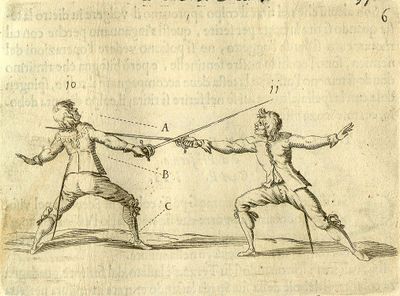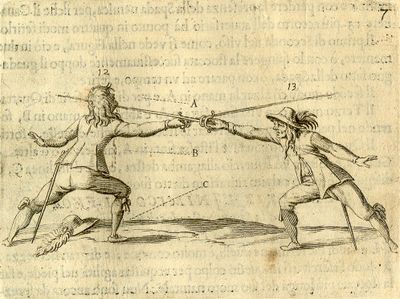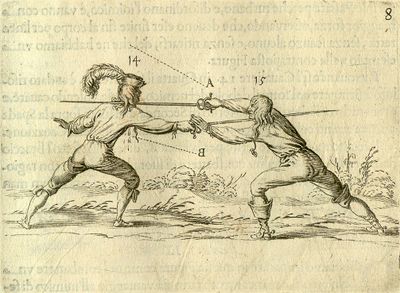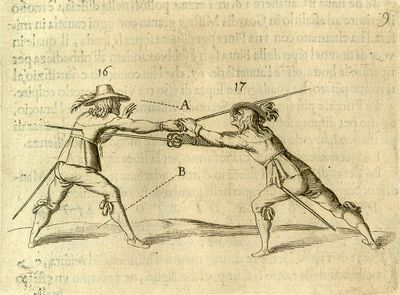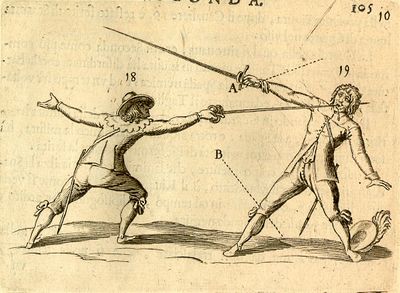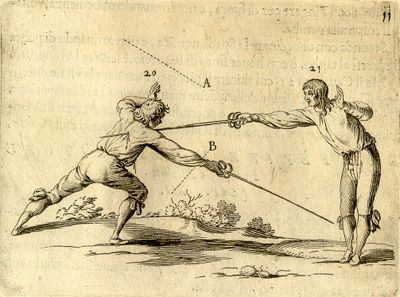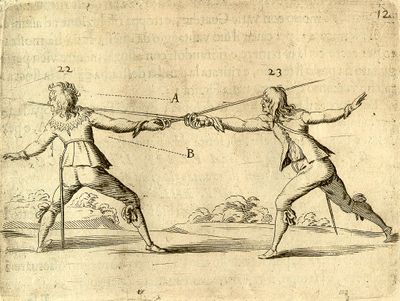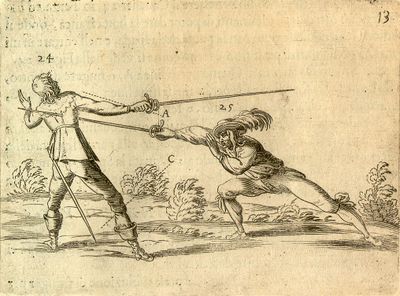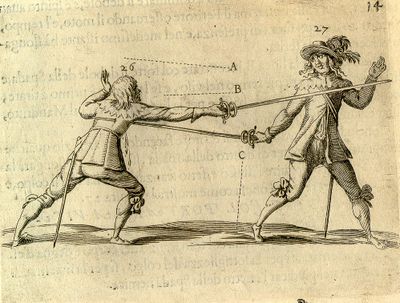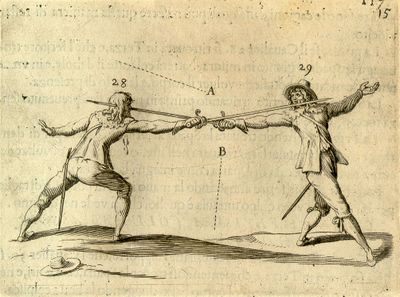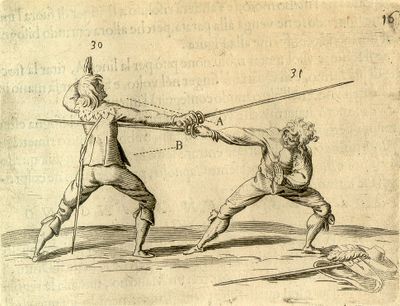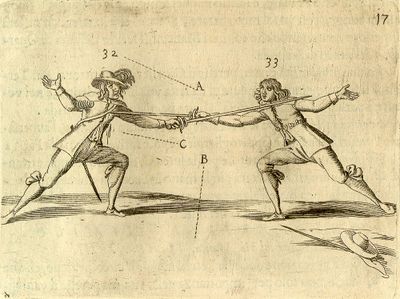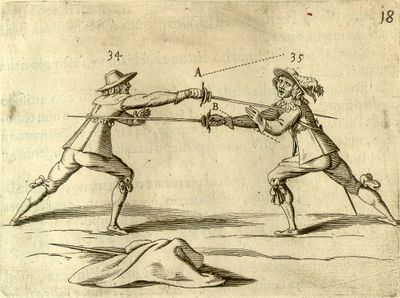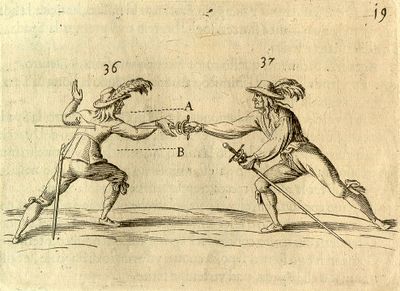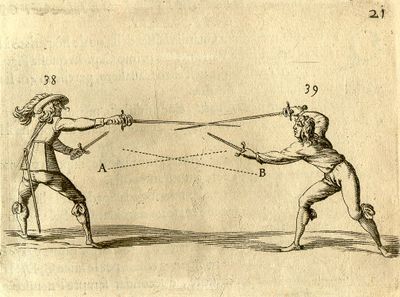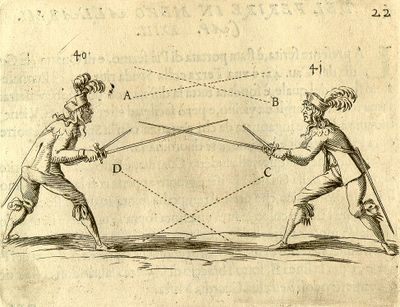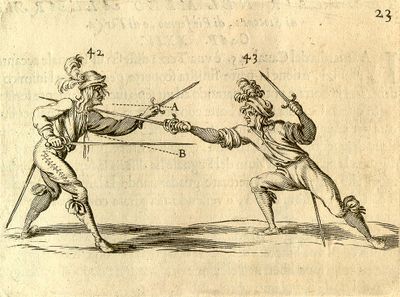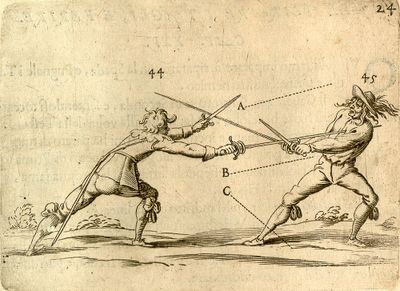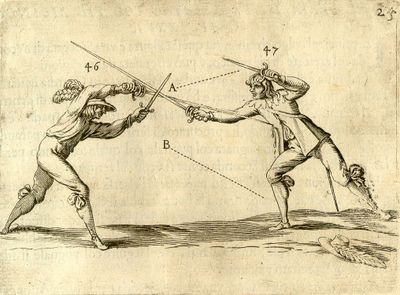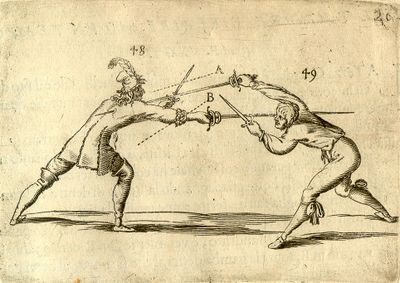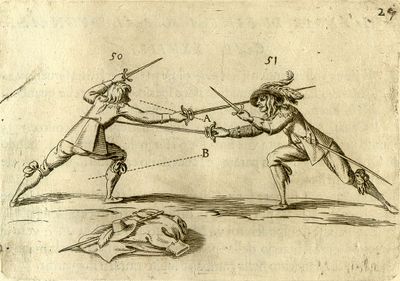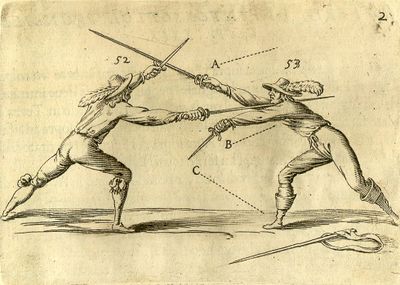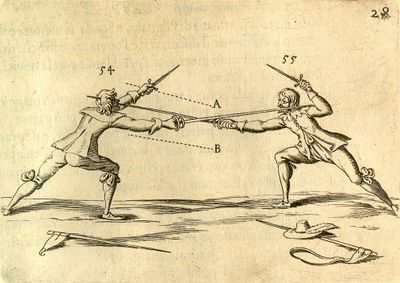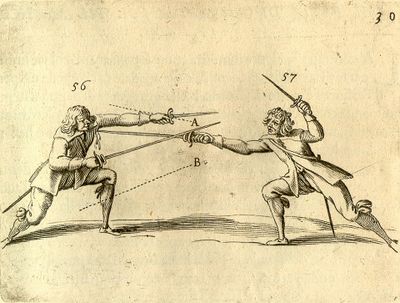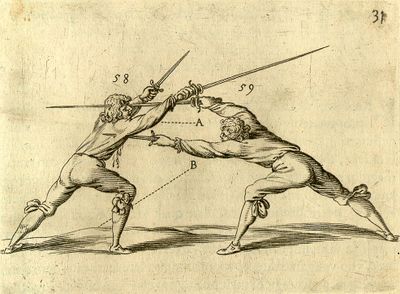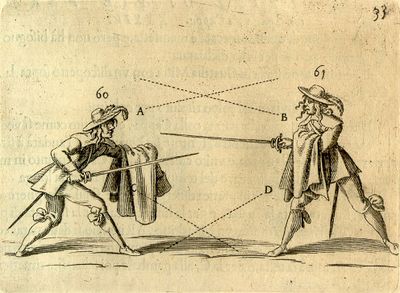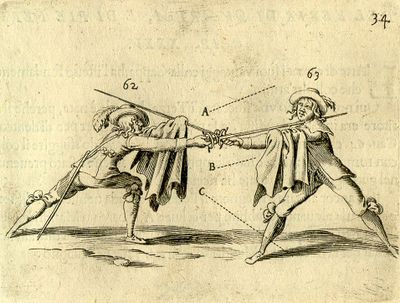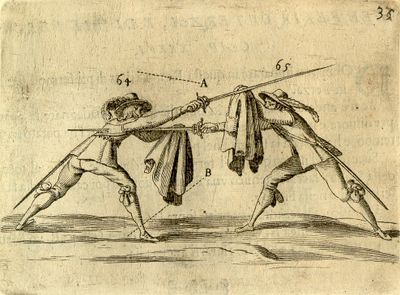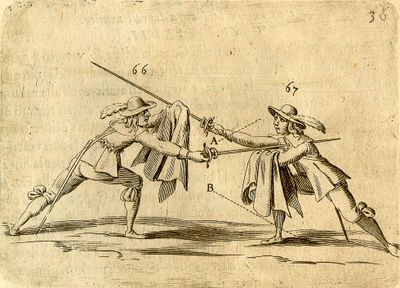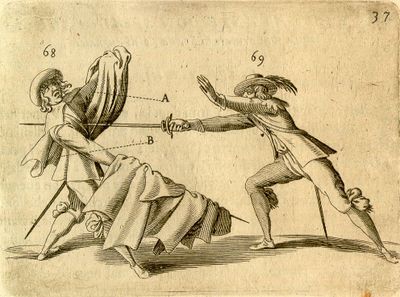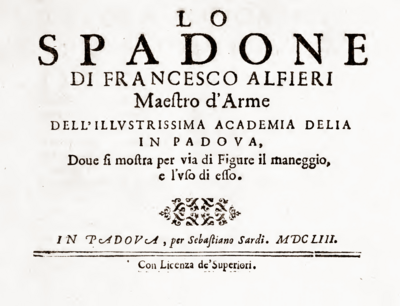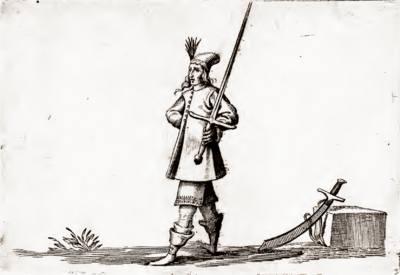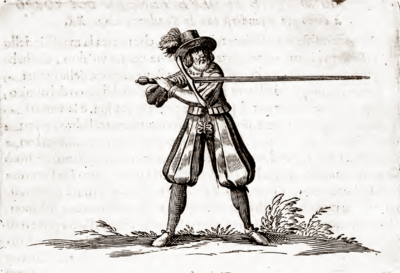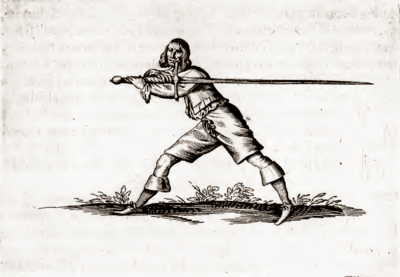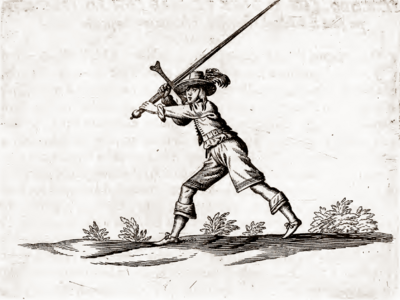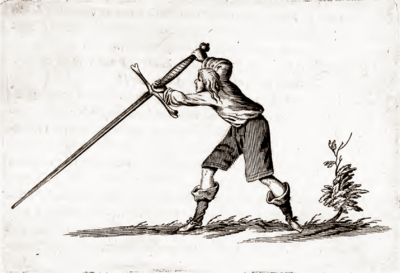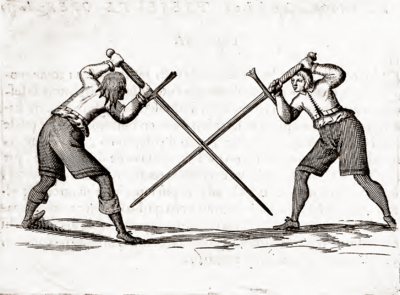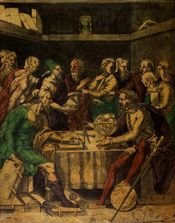|
|
You are not currently logged in. Are you accessing the unsecure (http) portal? Click here to switch to the secure portal. |
Difference between revisions of "Francesco Fernando Alfieri"
| Line 476: | Line 476: | ||
<br/> | <br/> | ||
[[file:La Picca (Alfieri) 02.png|2250x250px|center]] | [[file:La Picca (Alfieri) 02.png|2250x250px|center]] | ||
| − | | | + | | | <p>'''Most Illustrious Sir and Honourable Patron'''</p> |
| + | <p>The acquisition by your most illustrious house of the domain of Ortenburg, a most noble county in the Empire in Carinthia, was to me - as your most devoted servant, so joyful that I could not comprehend it in my heart. I was obliged to communicate it to the world with this present book, which as a living testimony of my infinite obligations I dedicate to the immortality of your most illustrious name. </p> | ||
| + | <p>The gift is small, and greatly disproportionate compared to the greatness of your merits, while in comparison my talents are also meagre. However, they are not without esteem, when they have the fortune to be accompanied by your favour. </p> | ||
| + | <p>I dedicated my treatise on the flag to Your Most Illustrious Excellency, which you were pleased to enjoy. Although all that can be acknowledged as singular in it is my veneration, my spirit - ever in a tone of respect, gives me hope that you will equally enjoy this brief treatise on the pike. </p> | ||
| + | <p>The laudable labours of intellect should by every right be offered to Your Most Illustrious Excellency, who for the splendour of the sublime virtues all around you, will at all times be beyond all compare. </p> | ||
| + | <p>In which gentlemanly art shall you not prevail? Which science, that in arms or civilian life can render one respected, in you does not merit to be admired? I think not to speak at length of your qualities, which is not a weight for my shoulders, I speak with the tongue of all, which is moved only by the truth. May Your Most Illustrious Excellency enjoy, with every peace, the possession of many goods, and be it my glory to be named among those who in perpetuity depend upon your gestures. To Your Most Illustrious Excellency I bow. </p> | ||
| + | <p>From Padua the 28th March 1641. </p> | ||
| + | |||
| + | <p>To Your Most Illustrious Excellency</p> | ||
| + | |||
| + | <p>Your most humble servant</p> | ||
| + | |||
| + | <p>Francesco Alfieri. </p> | ||
| + | |||
| | | | ||
{{pagetb|Page:La Picca (Francesco Fernando Alfieri) 1641.pdf|3|lbl=iii|p=1}} {{pagetb|Page:La Picca (Francesco Fernando Alfieri) 1641.pdf|4|lbl=iv|p=1}} | {{pagetb|Page:La Picca (Francesco Fernando Alfieri) 1641.pdf|3|lbl=iii|p=1}} {{pagetb|Page:La Picca (Francesco Fernando Alfieri) 1641.pdf|4|lbl=iv|p=1}} | ||
Revision as of 10:53, 18 November 2020
| Francesco Fernando Alfieri | |
|---|---|
 Portrait from 1640 | |
| Born | 16th century (?) |
| Died | 17th century |
| Occupation | Fencing master |
| Nationality | Italian |
| Genres | Fencing manual |
| Language | Italian |
| Notable work(s) |
|
Francesco Fernando Alfieri was a 17th century Italian fencing master. Little is known about his life, but Alfieri means "Ensign" which might be a military title rather than a family name. In his fencing treatise of 1640, he identifies himself as a master-at-arms to the Accademia Delia in Padua, and indicates that he had long experience at that time
In 1638, Alfieri published a treatise on flag drill entitled La Bandiera ("The Banner"). This was followed in 1640 by La Scherma ("On Fencing"), in which he treats the use of the rapier. Not content with these works, in 1641 he released La Picca ("The Pike"), which not only covers pike drill, but also includes a complete reprint of La Bandiera (complete with title page dated 1638). His treatise on rapier seems to have been especially popular, as it was reprinted in 1646 and then received a new edition in 1653 titled L’arte di ben maneggiare la spada ("The Art of Handling the Sword Well"), which not only includes the entirety of the 1640 edition, but also adds a concluding section on the spadone.
Treatise
Illustrations |
Draft Translation |
Transcription (1638) | ||||||||||||||||||||||||||||||||||||||||||||||||||||||||
|---|---|---|---|---|---|---|---|---|---|---|---|---|---|---|---|---|---|---|---|---|---|---|---|---|---|---|---|---|---|---|---|---|---|---|---|---|---|---|---|---|---|---|---|---|---|---|---|---|---|---|---|---|---|---|---|---|---|---|
The Flag by Francesco Ferdinando Alfieri, Master of Arms at the Illustrious Academy Delia of Padua In which it is demonstrated by way of figures an easy and new method, its handling, and its use with the defence of the sword. Dedicated to the Most Illustrious Sir, Sir Lodovico di Vidman Free Baron of San Paterniano, and Sommeregg, etc. In Padua, printed by Sebastiano Sardi. MDCXXXIIX. With Permission from the Authorities |
[i] LA BANDIERA DI FRANCESCO FER.º ALFIERI Maestro d'Arme dellʼIllustrissima Accademia Delia in Padoua. Nella quale si mostra per via di Figure una facile, e nova Practica, & il maneggio, e lʼuso di essa, con la difesa della spada. Dedicata allʼIllustrissimo Signor, il Signor LODOVICO DI VIDMAN LIBERO BARON DI .S: PATERNIANO, E SUMEREG` &c. IN PADOUA, per Sebastiano Sardi. M. DC. XXXIIX. Con Licenza de' Superiori. | |||||||||||||||||||||||||||||||||||||||||||||||||||||||||
To the Most Illustrious Sir Most Excellent and Honourable Sir and Patron Lodovico Conte di Vidman The benevolences I receive from Your Excellency daily are so frequent, and so generous, that considering what gratitude could be expected from my feeble, but above all devoted, service, I conceived to illustrate my obligations succinctly in these sheets of paper. Here, Your Excellency, is the fruit of my labours, dedicated in every respect to your generous name; such that under your protection it might acquire the esteem, that the little acumen of the author would be unable to grant it. You will see, Your Most Illustrious Excellency, the art that you deigned to learn, honouring my discipline. I have effortlessly persuaded myself that it would not displease you, to see printed this pastime which you occasionally enjoyed to practice. Nonetheless I am aware of the scarce value of my gift, but your magnanimous brilliance has emboldened me. My soul is overflowing with obeisant reverence, and Your Most Illustrious Excellency of benignity, to you I most humbly bow. |
[iii] ALL’ ILLVSTRISS.MO SIG. Sig. e Padron Colendiss.mo il Signor LODOVICO CONTE DI VIDMAN. SOn tante, e cosi grandi le grazie, che ogni giorno ricevo da V.S. Illustrissima, che pensando à quella gratitudine, che si può aspettare dalla mia debole ma sopra ogn’altra devota seruitù, mi sono ingegnato di figurare le mie obligazioni competidiosamente in queste carte. Ecco Illustrisimo Signore le primizie delle mie fadighe dedicate per ogni rispetto al suo generoso nome; e perche acquistino sotto la sua protezione quella stima, che non le hà potuta dare il basso ingegno dell’autore; Vedrà V.S. Illustrisima [iv] quell’arte, che s’è degnata d’apprendere coll’onorar la mia disciplina, e però mi son agevolmente per suaso che non le sia per dispiacere di vedere impresso ciò che per passatempo l’è piaciuto tal volta d’ esercitare, conosco tuttavia il poco valore di questo mio dono, ma il suo magnanimo genio m’hà fatto ardito: Il mio animo è colmo d’ossequiosa riverenza, e V.S. Illustrissima di benignità, ed umilissimamente me l’ inchino. | |||||||||||||||||||||||||||||||||||||||||||||||||||||||||
In Padua the 6 th day of September M.DC.XXXIIX. Your Most Illustrious Excellency Your Most Humble and Most Obliged Servant, Francesco Ferdinando Alfieri. |
Di Padova il dì 6. Settembre M. DC. XXXIIX.
| |||||||||||||||||||||||||||||||||||||||||||||||||||||||||
To the reader Reader I present to you my flag. If it is not handled according to your spirit, blame the fact that the task was beyond my abilities. The condition of this century brings such liberty, that everybody burdens the printing presses, and I too have allowed myself to be taken by this custom. I am sure you will tell me I have not dusted off many bookshelves, and I will reply that my books have been experience and practice, which I leave you the image thereof. That which I have in my mind to show you, if it does not seem completely new to you, neither is it trivial. Every master of arms professes some knowledge of it, few have written treatises and nobody up until now has condensed this art into the form that you see. I desire nothing more than to please you, and to benefit you. If I achieve this goal, and you also learn that which you seek, I nonetheless seek your pardon; and perhaps in short I will bring out a new treatise on all aspects of fencing, which will please you even more. Finally it is just to admit that he who labours for others is always worthy of being commended. |
[v] A CHI LEGGE. LEttore vi si presenta la mia bandiera, se non è maneggiata secondo il vostro spirito, datene la colpa allʼaffetto che è stato maggiore del mio sapere. La condizione di questo secolo porta seco tale libertà, tutti affadigano le stampe, ancorʼio mis son lassato vincere dal costume. Son cherto che mi direte che non hò spolverate molte scanzie, ed io vi risponderò, che i miei libri sono stati lʼesperienca, e lʼesercizio, e che lascio à voi altri lo speculare, quello che hò havuto nel pensiero di mostrarvi se non vi parrà in tutto nuovo, non è manco triviale. Ogni maestro dʼArme ne professa qualche notizia, pochi ne hanno trattato e nissuno fin quì hà ridotta questʼarte allʼordine che voi ve- [vi] dete; Io non desidero che di piacervi; e di giovarvi, se conseguirò questo mio fine, e voi anco acquistarete quel tanto che ricercate, voglio però che mi scusiate, e forse in breve con un trattato nuovo di tutte le parti della Scherma vi farò di maggior gusto, e poi finalmente è giustizia il confessare che sempre mai è degno dʼesser commendato chi per altri sʼaffadiga. | |||||||||||||||||||||||||||||||||||||||||||||||||||||||||
|
[vii-viii] Tavola de capitoli
| ||||||||||||||||||||||||||||||||||||||||||||||||||||||||||
The Flag by Francesco Ferdinando Alfieri From what I have been able to learn, from those few books that have come to my hands, from the discourses of great men, and from a long and uncommon experience, there is nothing in my judgement either more honourable or more necessary to a person of noble birth, than keeping their youth engaged in the practices that are useful to, and which help and adorn, the virtues of the soul. The antique and famous republics which will always serve as examples, and as stimuli to set on the path towards civic happiness, also prized virtue, skill, and agility, reputing as blessed those who were solemnly considered stronger and faster than others.[1] They were seen in the piazzas competing, some at wrestling, some launching the pole, they challenged themselves in races, they battered one another with the cestus, and at times by hurling discs or balls of wood, they put on show the gifts they had received from nature, enhanced through their art. These exercises were common into the early centuries of the Italic nation, and if they are never expressed with the pomp in which the inhabitants of the Peloponnese and Phrygia excelled, they have nonetheless been largely conserved up to the present age, as you can see every day principally in Tuscany, while other arts that were not practised in antiquity have been discovered. The practice of the flag will always be among the most commended, since it readies the foot, it renders the waist pliable; the hand becomes strong, the arm flexible. If we look to its origins, and to who was the first to unfurl it in an army we find in the holy scriptures that it was the great captain Moses,[2] he was followed first of all by the Assyrians, then the Egyptians followed the same example both with representations of bulls and other animals they held in veneration, and with numerous hieroglyphics alluding to victory, the pretexts and reasons for war, and to the strength and valour of their soldiers. Finally there is no people so barbaric, that it does not see its armies ordered and distinct under a particular standard. If we then turn to consider how useful and of what consequence it is in the management of war, although such a treatise would belong to a captain rather than to me, even I am clearly aware that the fortune and glory of war depends in large part on the flag, and that in truth via this instrument military discipline forms troops and centuriae, permits them to understand and execute commands, maintains them in order, and allows the parts of the army needed for victory to be deployed quickly and without confusion. Efforts should not be directed elsewhere, other than to seize flag. If it is lost it seems you must no longer fear resistance, there remains a confused and armed multitude without a guide, oppressed more by disorder than by iron. Thus we see that standards are the real trophies which render a warrior's valour immortal, and they are suspended in perpetual remembrance not only in private homes but also in public buildings and churches. Therefore the subject of the art I have chosen to demonstrate is itself a worthy one and perhaps inferior to no other. Some might wish to object, stating that the flag is employed in war, but not its art, to these I would reply with a question: is the ensign needed to defend the flag? One who would deny this hints at having a rare talent, and of being a few eggs short of a dozen.[3] If this is undeniable then, who is better able to defend the flag than one who knows how to handle it perfectly? Why is the pole armed if not intended to injure? To know how to wound it is necessary to practice the art, otherwise the flag serves only to entangle and envelop the hands, while it is horribly lost, holding it up being in vain. This does not occur in the hands of someone experienced, who when reduced to such extremes will have a ready solution appropriate to the situation. Emboldened by virtue one such as this will either rescue the flag from the enemy or will pursue it through vendetta. Therefore for those who understand this virtue, without need for further exposition, it will be a simple task to arrive at the mastery desired, observing the following figures which make clear the particulars that are difficult to express with words alone. |
[1] LA BANDIERA DI FRANCESCO FERNANDO ALFIERI. PEr quello, che hò potuto imparare, da quei pochi libri, che mi son venuti alle mani, dal discorso dʼhuomini grandi, e da una lunga, e non volgare esperienza, non è cosa al mio giudizio, ne più onorevole, ne più necessaria à persona di nobil nascita, quantoʼl tenerʼimpiegata la giovinezza neglʼesercizi che serveno, e dʼaiuto, e dʼornamento alle virtù dellʼanimo; LʼAntiche è fa- [2] mose Republiche le quali ci serviranno sempre dʼesempio, e di stimolo ad incominciarci per la via che ci conduce alla felicità civile hebbero in tanto pregio, e la destrezza e lʼagilità che reputavano beati quelli, che più forti, e più veloci de glʼaltri erano nelle loro solennità giudicati; Si vedeva nelle piazze contendere, altri alla Lotta, altri Lanciare il Palo, si cimentavano al corso, si battevano col Cesto, e talʼora collo scagliar rotelle, ò palle di legno facevano mostra di quei doni, che havevano ricevuti dalla Natura, e aggranditi coll'arte; Questi esercizi sono stati comuni ancor più dai primi secoli dall'Italica Nazione, e sebbene non si sono mai rappresentati con quella pompa nella quale eccellerono gli abitatori del Peloponneso, e della Frigia, si sono però sempre conservate in gran parte sino alla nostra età come si vede ogni dì principalmente nella Toscana, ed altri di più ne sono stati ritrovati che nella Antichità non furono un uso: lʼesercizio della Bandiera sarà sempre tra questi commendato imperochè in esso il piede si fa pronto, se rende pieghevole la vita, la mano acquista forza, e si discioglie il braccio; se riguardiamo la sua origine, e chi fosse il primiero che la spiegasse [3] negli esercizi, noi troviamo nelle sacre lettere che fu il gran Capitano Moisé, fu doppo innanzitutto da Siri, e seguirono l'istesso esempio glʼEgizi con figurarci dentro ora i Tori e gli animali che avevano in venerazione ed ora con diversi ieroglifici alludendo alla vittoria, al protesto e titolo della guerra, e alla forza e virtù de loro soldati, e finalmente non è gente così barbara che sotto una particolare Insegna non vede ordinate e distinte le sue milizie. Se dall'altro canto ci rivolgiamo a considerare di quanta utilità e di quanta conseguenza sia nel maneggio della guerra, benché simil trattato appartenga più tosto ad un capitano che a me, non e per questo che non conosca chiaramente ancorʼio, che dalla Bandiera non dependa in gran parte la fortuna e la gloria delle battaglie, e che ciò sia la verità la disciplina militare con questo mezzo forma le truppe e le centurie, le dispone ad intendere ed eseguire 'l comando, le ritiene in ordinanza, e viene ad impiegar a tempo e senza confusione quelle parti dell'esercito che sanno di bisogno per acquistarsi la vittoria. Tutti gli sforzi non vanno a ferire altrove che ad insignorirsi dellʼInsegna, se queste si perdono non par che più [4] si tema resistenza, rimane una confusa moltitudine armata senza guida, e più dal disordine che dal ferro oppressa, cosi vediamo che li stendardi sono i veri trofei con i quali si rende immortale i1 valore delle persone guerriere tenendoli sospesi a perpetua memoria non solo nelle case private ma nè pubblici palazzi e nellʼistessi tempi, talchè il soggetto dellʼarte che mi son preso a dimostrare è per se degno e forse a nissun altro inferiore. Né sia chi voglia oppormisi, con dir che nella guerra faceva di mestiero lʼ Insegna ma non già l'arte, perchè a questi tali risponderei con un quesito, ed è. Se allʼAlfiere sia necessario il difendere l'Insegna, chi lo negasse darebbe indizio d'avere una strana capacità, e d'esser tenero di sale, se non si può negare chi meglio lo potrà difendere di quello che la saprà perfettamente adoperare? Per quale cagione è armata l'asta se no nper ferire? e per saper ferire è necessario esercitarsi nellʼ arte, che altrimenti non ad altro serve che ad intrigare ed inviluppare le mani, e bruttamente si perde, si come inutilmente si sostiene;il che non accade ad uno sperimentato il quale venendo ridotto a simili estremità avrà pronti i partiti che saran- [5] no appropriati al caso. E fatto ardito dalla virtù, o salvarà lʼInsegna da nemici, o lʼaccompagnarà con la vendetta; a quelli dunque che senzʼaltri discorsi conoscano queste virtù sarà facile impresa l'arrivarne alla perfezione che si desidera, osservando le seguenti figure nelle quali si fanno palesi quelle particolarità che, difficilmente, si possono dichiarare con le parole. | |||||||||||||||||||||||||||||||||||||||||||||||||||||||||
How the ensign or other person should present themselves with the standard Chapter I Wishing to proceed in an appropriate order, to arrive at a perfect understanding of this art, we must begin with its principles, since all of its perfections derive from these. In truth I confess that skill, strength and gracefulness are gifts dispensed by nature. Nonetheless with exercise and good discipline they can be acquired and developed. Therefore the movement of the ensign, or other person who wishes to handle the standard for pleasure, should be free, smooth, but also ordered and martial. You should take it with your right hand, as more noble, and passing it to your left you should gather the edges, and grasp them together with the haft, which resting on the arm, situates the flag at the breast as the figure shows. In this manner, without having to change hands and take two tempi, you can quickly unsheath the sword, and employ it as the occasion demands. |
[6] COME DEBBA LʼALFIERE, Ò ALTRA PERSONA presentarsi collʼInsegna. Cap. I. VOlendo con quellʼordine che si conviene venire alla perfetta notizia di questʼarte, bisogna essere osservante dei suoi principi, perché da essi come da sua origine tutte le perfezioni derivano.Confesso veramente che la destrezza e la forza e la leggiadria son grazie che vengon disponsate da natura, nulla di meno si possono in gran parte collʼesercizio. e con la buona disciplina, e accrescere ed acquistare. Sarà dunque il movimento dellʼAlfiere, o dʼaltra persona, che voglia per di porto maneggiare lʼInsegna, libero ma ben composto, grave, ma però militare. Si prenderà con la destra come più nobile, e portandola nella sinistra si devono raccorre i lembi, ed impugnarli con lʼasta che appongiandosi nel braccio, formarà la Bandiera il Seno, che dimostra la figura. In tal modo senzʼaver a cangiar mano e far due tempi, si può sfodrare speditamente la spada, e valersene a quellʼuso che dallʼoccasione si richiede. | |||||||||||||||||||||||||||||||||||||||||||||||||||||||||
On hoisting the standard Chapter II To hoist the standard you take it with your right, lifting it so it unfolds, and assuming that the wind and location allow it, you find yourself in the posture seen in the picture. With your right foot, pole hand, and your waist gracefully in unison, you may salute the spectators before commencing your play, noting that for an army passing before a prince, general or other great personage it is an act of reverence to lower it to the ground waving it with a riverso.[4] |
[8] DELLʼINALBERARE LʼINSEGNA. CAP. II. PEr inalberare lʼInsegna si prenda con la destra e levandola in alto si dispiega, e supponendo che lo permetta il vento, e la capacità del luogo, ritrovandosi nella postura che si vede nel disegno potrà col piè destro, con la mano dellʼasta e col garbo della vita unitamente, riverire gli spettatori prima di mettersi in giuoco, avvertendo,. che nella milizia passando davanti al Principe, al Generale, o altro personaggio grande è atto di reverenza ondeggiandola di rivercio abbassandola sino a terra. | |||||||||||||||||||||||||||||||||||||||||||||||||||||||||
On the first method of beginning to handle the standard Chapter III This is the first lesson, in which we begin to walk. To attain the honour that is desired, the body should be somewhat bent and braced to take its force. The arm should be extended, strong and raised above the head. Passing with an ample but natural step, at the same time you will judiciously catch the wind with a mandritto, which unfurls and does not entangle the standard. This is followed by a riverso on the second pass, continuing in this manner as desired. You can also change hands, and the greatest skill is to throw the flag and take it in the air, which by its nature changes hands. |
[10] DEL MODO PRIMIERO di cominciare à maneggiar lʼInsegna. CAP. III. QUesta è la prima lezione con la quale si comincia il passeggio, e per conseguire quellʼonore che si brama, deve il corpo essere alquanto piegato e disposto alla forza. Il braccio sarà disteso, forte, ed innalzato sopra la testa, e muovendo il passo naturale ma generoso, formarà, ad un tempo di man dritto la velata pigliando con giudizio il vento, che distenda non inviluppi lʼinsegna; si replica doppo volgendo la man di rivescio il secondo giro, e si và in tal modo continuando secondo il pensiero. Si può ancora cangiar mano, ed allora è maggior destrezza il buttarla e prenderla nellʼaria, che naturalmente mutarla. | |||||||||||||||||||||||||||||||||||||||||||||||||||||||||
On thrusting with the standard Chapter IV All the lessons are arranged so that one is linked to the next. Here we learn how to deliver a thrust with the standard. This serves not only to demonstrate the skill and ability of the player, but could also be necessary to employ in war. The arm should be stretched out, and having flourished a circular mandritto with your right hand over your head, you should quickly push the flag forwards without wasting time, thrusting in quarta. After you should turn your arm and hand into seconda, and in unison with your left foot extend the blow, always taking into account the wind, and correct footing, to avoid misadventures, which detract from the merit of what you wish to accomplish. The same exercise can be done with the left hand which is all the more commendable, as by nature this member is usually weaker and less practised. |
[12] DEL TIRAR LE STOCATTE COLLʼ INSEGNA. CAP. IV. TUtte le lezioni sono talmente ordinate che lʼuna è concatenata collʼaltra. Qui, dobbiamo imparare come si tirino le stoccate collʼInsegna, e ciò non solo serve a mostrare la disposizione e la destrezza di chi giuoca, ma può darsi caso che faccia di mestiere praticarlo nella guerra. Si terrà dunque il braccio disteso, e data una velata in giro di man dritto per disopra della testa, si deve subito spingere avanti senza perder tempo la Bandiera, col tirar la stoccata di quarta, si. voltarà. doppo il braccio, e la mano in seconda, e collʼunire il piede stanco si slongarà parimenti la botta, avendo sempre riguardo al vento, al moto e alla giustezza del passo per isfuggire gli sconci, che levano il merito a quanto si viene ad operare. Si può ancora fare le medesime lezioni con la mano sinistra, il che è tanto più lodevole quanto suol essere questo membro per natura più debole e meno esercitato. | |||||||||||||||||||||||||||||||||||||||||||||||||||||||||
How to handle the flag with the hand reversed Chapter V This lesson is difficult but beautiful, and truly novel. You grip the shaft with the hand reversed, as it appears in the figure opposite, the arm must be somewhat gathered to help the wrist, which is encumbered by the weight. By taking smaller steps, with the movement of the hand rising from one flank to the other, the undulating volume of the flag is made to wave from one side to the other without confusion, while you interpose two or three passes under the leg or circle it behind the lower back, changing hands, however you prefer. |
[14] COME SI MANEGGI LA BANDIERA con la mano rivercia. CAP. V. QUesta lezione è difficile ma però bella, e veramente bizzarra. Sʼimpugna lʼasta con la mano rivercia, si fa come appare nella contrapposta figura, il braccio deve essere alquanto raccolto per aiutare il polso affatigato dal peso, e formando più ristretto il passo, al movimento della mano montante da un fianco allʼaltro ci faranno andeggiare senza confusione i tortuosi volumi dellʼInsegna, tramezzandovi due o tre sottogambe. o girandole per dietro le reni, e cambiando mano conforme a quello che maggiormente aggrada. | |||||||||||||||||||||||||||||||||||||||||||||||||||||||||
On passing the flag under the legs Chapter VI With the standard in motion, and wishing to perform the current lesson, the flag is launched into the air and caught with the hand reversed. Then with the arm turned and the body bent it is passed under the left leg towards the right. In the same motion it is then passed behind the lower back and taken with the left hand, and passed again under the right leg to the left. This can be repeated with either hand as your skill and vigour dictates. |
[16] A PASSARE L'INSEGNA sotto le gambe. CAP. VI. HAvendo lʼInsegna in moto, e volendo fare la presente lezione, si scaglia in aria e si ricoglie con la mano rivercia che voltata col braccio ed incurvato il corpo si fa passare sotto la gamba sinistra col girarla per la destra, ed allora tuttʼad un tempo si spiega di rivercio dietro le reni e si prende con la mano stanca facendosi ripassare sotto la destra gamba per la sinistra e questo si può con ambedue replicare per quanto lo comporta e la destrezza, e la lena. | |||||||||||||||||||||||||||||||||||||||||||||||||||||||||
On launching the standard Chapter VII I know very well that the unusual always delights, and for this reason I have applied myself to collect and create the lessons you now see. To narrate this figure, you wave a circular flourish with a mandritto, then throw the flag in the air, retrieving it with your other hand. This same play is continued, always keeping your arm in time with your foot, skilfully catching the wind. Other passes can be interposed, under the leg or other variations, serving to embellish the lessons and demonstrate the bravura of the practitioner. |
[18] A SCAGLIARE LʼINSEGNA. CAP. VII. IO so molto bene che le cose varie sempre dilettano, e per tale cagione mi sono ingegnato e di raccorre e di inventare le lezioni che si vedono. Per intendere la presente figura, si tira in giro di man dritto una velata, doppo si butta in aria la Bandiera, si ricoglie collʼaltra mano e si và facendo lʼistesso giuoco, accompagnando sempre col braccio il piede, e collʼartifizio il vento. Vi si possono ancora frapporre alcune passate di sotto gamba ed altre mutanze, che servono dʼornamento alle lezioni ad a mostrare lo spirito di chi le pratica. | |||||||||||||||||||||||||||||||||||||||||||||||||||||||||
How to perform a molinello Chapter VIII The molinello is delightful. To perform it comfortably, you should have the standard in your right hand. You complete a full turn above the head, then throw it up in the air, catching it around the middle of the standard as the figure shows. The molinello is then turned towards the rear foot. After several rotations, as your the hand becomes fatigued, you should grip the butt of the flag with your other hand and repeat the same lesson, again throwing it in the air as described above. |
[20] COME SI DEBBA FARE il Molinello. CAP. VIII. IL molinello è di molta vaghezza e per farlo con ogni facilità fà dì mestiere aver lʼInsegna nella man dritta; si compisce per sopra il capo unʼintera girata, ed allora si scaglia in aria, e si piglia intorno al mezo comʼinsegna la figura. Si volta il molinello verso il piede, che resta indietro, e fatte più ruote, divenuta la mano debole, si piglia collʼ altra il calcio della bandiera e si fà la medesima lezione, col buttarla parimenti in aria come sopra si è detto. | |||||||||||||||||||||||||||||||||||||||||||||||||||||||||
How to manage the standard behind your lower back Chapter IX This figure presents a wonderful innovation in this art. In order that everybody may understand it, I will briefly describe it. The flag should start in your right hand. Having performed a full flourish above your head, it is pulled backwards and with a reverse turn it is carried behind your back on the left side, where it can be fluttered several times, as desired, with your left hand. This can be performed while walking, or standing without walking. However it is always necessary to watch the length of your stride, and the wind, since it is dangerous to err while both hands are occupied, and you cannot view the motion of the flag, because in order to display your mastery we advise not to stare at it. Everyone can perform this same lesson with the left hand, loosening the arm and bringing it into presence, observing the order prescribed above. |
[22] COME SI MANEGGI LʼINSEGNA DIETRO LE RENI. CAP. IX. DImostra la presente figura una bellissima invenzione di questʼarte, e perché da ciascheduno possa essere intesa, brevemente la dichiararò. Deve ritrovarsi lʼinsegna nella man dritta, e fatta unʼintera sventolata sopra la testa, si rivolta di rivercio e con un giro si porta dietro le spalle nel lato manco, dove con lʼaiuto della man sinistra si formano vari ondeggiamenti a beneplacito, e questo si può far mettendosi in passeggio, o pure stando senza camminare; è però tanto più necessario lʼavere lʼocchio alla misura del passo, e del vento, quanto è più pericolo lʼerrore dove le mani sono ambe occupate, e non si può collʼocchio dar regola al moto della Bandiera, che per palesar la maestria ci proponiamo di non voler rimirare. Sarà libero a ciascheduno il poter fare con la sinistra la medisima lezione sciogliendo il braccio e portandolo en preferenza, con osservare lʼordine che di sopra è stato prescritto. | |||||||||||||||||||||||||||||||||||||||||||||||||||||||||
On waving the flag behind your back Chapter X In this figure the arm is kept extended, and very prominent, and after turning it behind your back, the standard is played from one side to the other, stepping proportionately so it does not get entangled. After a few waves you can repeat with your left hand, which I will omit to avoid being bothersome by lengthening my discourse. |
[24] DELLʼ ONDEGGIAR LA BANDIERA dietro le spalle. CAP. X. IN questa figura si tiene il braccio disteso, e molto eminente, e volgendolo doppo le reni, si fà giocare dallʼuno e lʼaltro lato lʼInsegna, muovendo il passo a proporzione perché non sʼavviluppi, ed il tutto doppo alcuni ondeggiamenti si può anco replicare con la sinistra, sopra la quale per non diventare molesti tralascierò dʼallongarmi nel discorso. | |||||||||||||||||||||||||||||||||||||||||||||||||||||||||
On how the standard is passed under the legs Chapter XI Having completed several steps, with both mandritti and riversi, you should raise the flag as required, adjusting for the ripples which form in various places, and finally bend your waist in the manner depicted. Having circled it above your head, you should lower your arm, passing the standard under your right leg, and by taking it with your left hand, the lesson you have followed has been performed. |
[26] DEL MODO CON CHE SI PASSA LʼInsegna sotto le Gambe. CAP. XI. DOppo dʼaver fatti più passaggi, e di man dritto e di rivercio, alzata secondoʻl bisogno la Bandiera, ed aggiustata allʼonde, che si formano in vari siti, finalmente si deve piegare la vita nella maniera che è stata figurata, ed avendo fatto un giro sopra la testa sʼabbassa il braccio, e si fà passar lʼInsegna sotto la gamba destra, e presala con la man sinistra si segue la lezione che è stata fatta. | |||||||||||||||||||||||||||||||||||||||||||||||||||||||||
On passing the standard around your neck Chapter XII I propose passing the flag around your neck. For this innovation your arm should tend to be high and extended. Having completed a few waves, you should judge the tempo so that the flag rests on your right shoulder. By pushing it, while catching a little wind from the left, you should let go of the shaft, turning your waist to retake the flag in the middle of the shaft, as the image indicates, entering into molinelli, and after the usual waves this lesson can be repeated with your left hand. |
[28] A FAR PASSARE LʼINSEGNA, intorno al Collo. CAP. XII. SI propone ai far passare intorno al collo la Bandiera. Questa invenzione ricerca il braccio al solito disteso, e alto, e date alcune velate si prende ʻl tempo acciò venga a posarsi nella spalla dritta, e spinta col darle un poco divento nella sinistra sʼabbandona lʼasta e volgendo la vita si ripiglia nel mezzo, come accenna il disegno, sʼentra ne molinelli, e doppo lʼusati ondeggiamenti si può replicare lʼistesso con la man manca. | |||||||||||||||||||||||||||||||||||||||||||||||||||||||||
How to throw the standard while walking, changing hands Chapter XIII I hope to avoid being tedious by repeating the same things, or to become unclear by neglecting them. The standard is always in motion once the lessons begin, and the principal motions are the mandritti and riversi, which form the waves of the flag and are performed above your head. I am therefore forced to repeat this for the figure presented here, as we must connect them to what I wish to describe. Having circled with a riverso you should throw the flag high, and taking it with your left hand you should perform the same towards your right side. This can be repeated many times from one side to the other before beginning a new play, the entertainment and delight that lovers of this exercise feel deriving from its novelty. This assumes as always that the timing, step, and wind are duly observed, without which every effort loses merit and earns nothing but reproach. |
[30] COME SI DEBBA SCAGLIARE LʼINSEGNA Nel passeggio, e cangiar mano. CAP. XIII. IO temo di non esser tedioso nel replicar lʼistesse cose, e diventar oscuro nel tralasciarle. LʼInsegna è sempre in moto, quando si principian le lezioni, ed i moti principali sono i mandritti, e i riverci con i quali sopra la testa si formano e si compiscono le velate. Sono adunque forzato a ripeterli nella proposta figura, perché ad essi dobbiamo connettere quello che è lʼintento nostro di dichiarare. Fatto il giro di rivercio si buttarà in alto la Bandiera, e presa colla mano stanca si farà lʼistesso, e parimente si scagliarà dalla parte destra, il che e dallʼuna e dallʼaltra più volte replicato, si cominciarà nuovo giuoco, potendosi della novità pigliar quel trattenimento e quel diletto che sentono glʼamatori delle virtù, supponendo sempre che ʻl tempo, il passo, e ʻl vento habbino la dovuta proporzione, senza la quale perde ogni fadiga ʻl merito e non sʼacquista altro che biasimo. | |||||||||||||||||||||||||||||||||||||||||||||||||||||||||
On handling the standard under your legs Chapter XIV Having performed the rotations above, and with the standard in your left hand, it should be lowered, and by circling a mandritto it should be carried and helped along under your leg, forming waves as shown by the figure. Having retrieved it either on the side it was put in on, or from under your left leg, you should change hands, with equal mastery executing again what has been described. |
[32] DEL MANEGGIO DELLʼ INSEGNA sotto la Gamba. CAP. XIV. SI fanno le sopradette rotate ed avendo lʼinsegna nella man manca, sʼabbassa, e con un giro di man dritto si porta sotto la gamba ed aiutata come si vede nella figura si formano lʼonde, e doppo si cava per la via, che sʼè stata messa, o di sotto la gamba sinistra, si cangia mano, e con egual maestria si torna a porre in opera quanto abbiamo dichiarato. | |||||||||||||||||||||||||||||||||||||||||||||||||||||||||
On thrusts with the standard in the form of a cross Chapter XV The flag should be kept hoisted, and having circled a riverso in the usual way above your head, you should perform a thrust to your left side accompanied by your foot. Turning the flag towards your right side, you should then perform a thrust with the same mastery. The cross is completed by another two attacks. Your front foot should always be followed by your rear foot, and although everything is in itself quite straightforward, it is nonetheless difficult to put into practice without a maestro. |
[34] DELLE STOCCATE IN CROCE dellʼInsegna. CAP. XV. SI tiene la bandiera inarborata, e fatto un giro di rivercio al modo usato sopra la testa sʼaccompagnarà col piede una stoccata verso la parte manca, e volgendola verso la parte destra si tirarà la stoccata con la stessa maestria; si finisce la croce con altre due botte, il piè davanti deve sempre esser seguito da quel che è dietro, e benché il tutto sia di per se stesso assai chiaro, nulladimeno difficilmente si potrebbe mettere in pratica senza maestro. | |||||||||||||||||||||||||||||||||||||||||||||||||||||||||
On throwing the flag high behind your back Chapter XVI This lesson is difficult and requires the usual waves as a prelude. After these, it is performed with a riverso, passing the flag behind your back and raising it, although it rests on your lower back, throwing it high in the air with the force of your hand and in particular with your index finger. It is made to pass over your left shoulder, where it is grabbed by your left hand, before the play is repeated. Once completed the flag returns to your the right hand, although it is also possible to recover the pole without passing it from one hand into the other. |
[36] DEL GITTAR IN ALTO LA BANDIERA dietro le spalle. CAP. XVI. QUesta lezione è difficile e richiede anchʼessa le solite sventolate agguisa di preludi, si fa doppo con un rivercio passar dietro le spalle ed alzandola benché appoggiata alle reni si tira in alto con la forza della mano ed in particolare dellʼindice, e si fà passare sopra la spalla manca, qui si piglia con la mano sinistra e si rinnova il giuoco, il quale finito si torna alla man dritta potendosi ancora senza cambiar mano ricogliersi lʼasta. | |||||||||||||||||||||||||||||||||||||||||||||||||||||||||
On passing the standard under the legs starting from the right Chapter XVII To perform the lesson shown here, having finished to circle a riverso, you should turn a mandritto while bending your body and lowering the standard, bringing it under both your legs starting from the right. All of this is performed in just one tempo, and what can be performed with one hand can always be performed with the other. |
[38] DEL PASSARE LʼINSEGNA sotto ambe le gambe cominciando dalla dritta. CAP. XVII. PEr far la lezione che si mostra, finito il giro di rivercio, si volta un mandritto con incurvare il corpo ed abbassare lʼinsegna, e si porta per di sotto ad ambe le gambe cominciando dalla dritta, si fà tutto in un tempo solo, e quello che si fà con una mano si può fare sempre con lʼaltra. | |||||||||||||||||||||||||||||||||||||||||||||||||||||||||
On montanti[5] with the right hand Chapter XVIII We have arrived at the manner of forming montanti. There is no guard or blow in fencing that cannot be adapted to the art of the flag. To perform what I wish to teach with this figure, the flag starts in your right hand, in motion above your head. Having finished to circle, the montanti begin first from your left side, and then from your right, redoubling them as you desire. You can also swap hands and repeat the same lesson, as we have described many many times in the other chapters. |
[40] DE MONTANTI DELLA Man Destra. CAP. XVIII. SIamo venuti al modo come formar si debbano i montanti. Non vʼè guardia né colpo da scherma che non venghi adattato allʼarte dellʼInsegna, e volendo far quello che è mio pensiero insegnare nella presente figura, si ritrovarà la Bandiera in passeggio di man dritta sopra la testa, e finita la giratta si cominciarà il montante prima dal sinistro, e poi dal destro lato, e raddoppiandoli a suo piacere, si può cangiar mano, e fai lʼistessa lezione, si come neglʼaltri capitoli abbiamo più e più volte dimostrato. | |||||||||||||||||||||||||||||||||||||||||||||||||||||||||
On throwing and recovering the standard with the same hand Chapter XIX In the handling of the flag it seems that dexterity and agility matter more than strength, but at times these attributes must be equal to one another and are of utmost importance. The truth of this is manifestly demonstrated by this figure. After several steps and flourishes of the flag you should firmly plant your feet, then turn a mandritto over your head and extend a half-thrust, launching the standard into the air with all the force of your lower back and your hand so that it rotates a turn and a half and drops as illustrated by the figure, retrieving it with the same hand. You then return to normal play, which is the usual prelude to a new lesson. |
[42] DEL BUTTARE, E RICCORE LʼINSEGNA con lʼistessa mano. CAP. XIX. NEl maneggio della bandiera par che la destrezza e lʼagilità preuguaglino la forza, ma alle volte deveno andar del pari ed essere in sommo grado, e che sia la verità manifestatamene si comprende nella nostra figura, perché doppo vari passaggi e velate della bandiera bisogna ben fermarsi ne piedi ed allora si deve di man dritta voltar una rotata sopra la testa e slogando una mezza stoccata, si tira con ogni forza e delle reni e della mano, lʼInsegna in aria si che giri, una volta e mezzo, e cada come è impresso nella figura, si prende con lʼistessa mano, e si ritorna al giuoco ordenario, che suole sempre essereʼl principio dʼuna nuova azione. | |||||||||||||||||||||||||||||||||||||||||||||||||||||||||
On the standard with the hand reversed Chapter XX Having performed the last flourish to enter into this lesson, the standard is thrown into the air and gathered with the hand reversed. Your arm should be extended, and the tip of the staff must be pointed towards the ground. With judicious use of timing, and the wind, you will be able to perform waves, flourishes, passes under the leg, turns of the flag behind your lower back, and all that you have been able to learn from the faithfulness and merit of your maestro. |
[44] DELLʼ INSEGNA sotto mano. CAP. XX. FAtta lʼultima velata per entrare nella nostra lezione, si gitta lʼinsegna in aria e si ricoglie con la mano rivercia, il braccio sarà disteso, e la punta dellʼasta deve essere volta verso terra, e valendosi aggiustatamene del tempo, e del vento potrà fare ondeggiamenti, velate, sottogambe, girate di bandiera dietro le reni, e tutto quello che avrà potuto imparare dalla fedeltà, e valore del suo maestro. | |||||||||||||||||||||||||||||||||||||||||||||||||||||||||
On gathering the standard Chapter XXI All the things that bring us delight, if they pass beyond a certain point, become bothersome. The end is the completion of the work undertaken. Having therefore to gather the standard, you should hold it with your right hand over your shoulder, and catching a bit of wind, the edge should be grasped with your left hand. Thereby holding it in the posture shown you may end your labours with high praise. |
[46] DEL RACCOGLIERE LʼINSEGNA. CAP. XXI. TUtte le cose che ci arrecano diletto, se passano il segno diventano moleste, il fine e la perfezione di ciò che cominciamo ad operare, però dovendo dunque raccorre lʼinsegna si terrà con la man dritta nella spalla e dandogli un poco di vento si piglierà per filo vicino al lembo con la mano stanca, e così tenendola nella postura del legno si potrà con lode terminare le sue fatighe. | |||||||||||||||||||||||||||||||||||||||||||||||||||||||||
On putting your hand to the sword Chapter XXII The sword is a weapon that is used in various ways, the effeminate use it to ornament their perfumed finery, and to strong men it is minister of wrath, in defence of duty. But refraining from speaking too long on the subject, I will continue with as much as I propose to say on this topic for now. Wishing therefore to unsheath your sword, if the flag is in your right hand, you can throw it in the air and catch it with your left, or without this action you can pass it naturally into the other hand. Raising the flag so that you have more room at your flank, the sword can be drawn as clearly demonstrated by the figure. Putting yourself in a firm stance, all that remains is to show yourself as experienced in this noble practice. If you wish to change hands, the sword should be placed under your arm, and having grasped the standard, your left will be armed, and you can perform whichever passages or lessons of the art you have learned. |
[48] DEL METTER MANO ALLA SPADA CAP. XXII. LA spada è unʼarma che diversamente sʼimpiega; glʼeffemminati se ne vagliono per ornamento della loro profumata attillatura, e agli uomini forti è ministra dʼira, che defende il dovere; ma riservandomi di parlar più longamente in breve sopra questo soggetto, seguitarò per ora quel tanto che mi sono proposto. Volendosi dunque venire a sfodrare la spada, se la bandiera sarà nella man dritta, si può scagliare in aria e prenderla con la sinistra, o senza questʼatto la possiamo portare naturalmente nellʼaltra mano, ed alzandola per avere il fianco più libero si trarrà fuor la spada come si vede chiaramente nella figura, e mettendosi ad un passo ben regolato non restarà di farsi conoscere sperimentato in questo nobile esercizio, e volendo cambiar mano, si metterà la spada sotto il braccio, e presa lʼInsegna, resterà armata la sinistra, e si potranno fare quei passaggi e quelle lezioni che si sono apprese nellʼarte. | |||||||||||||||||||||||||||||||||||||||||||||||||||||||||
On walking with sword and flag Chapter XXIII The first admonishment we must give to explain this figure, is that the sword and the flag must be held firmly and solidly. You are free to play according to your inclination, and the hand can be changed in one tempo by throwing the standard forwards into the air, grabbing the sword as it falls. This can be performed several times, because it is a beautiful lesson, and truly worthy of being observed. |
[50] DEL CAMINAR COLLA SPADA, e Bandiera. CAP. XXIII. IL primo auvertimento, che dobbiamo havere per dichiarazione della figura, si è, che la spada, e la bandiera, deveno essere, impugnate sodamente, e con fermezza, é libero il giocare secondo il genio, e si potrà cambiare la mano ad un tempo istesso buttando in aria lʼInsegna ed avanti, che cada pigliando la spada, e ciò si potrá far più volte, perche è una bellissima lezione, e veramente degna dʼesser osservata. | |||||||||||||||||||||||||||||||||||||||||||||||||||||||||
On managing the standard with your right, while your left is armed Chapter XXIV It is a fixed rule that the standard should never be idle. While your left hand holds the sword your right nevertheless remains free, but when it is somehow hindered, as I have said elsewhere, it is all the more praiseworthy. Performing this lesson with your hand behind your back, your left hand should be raised as per the figure, and with the usual waves of the flag, you can loosen your arm and enter into another lesson, changing hands, catching the wind and taking the tempo as required. |
[52] DEL MANEGGIAR LʼINSEGNA con la dritta essendo armata la man sinistra. CAP. XXIV. QUesta è fermissima regola, che lʼInsegna non deve mai essere oziosa, e però se bene la man sinistra regge la spada, rimane tuttavia libera la destra, e quando sia in qualche modo impedita come ho detto altre volte, tantʼè più lode, e facendo la lezione di rivescio il braccio sinistro si terrà alzato siccome è nel disegno, e formando i soliti seni collʼondeggiar della bandiera, sciorrà doppo il braccio, sʼentrerà nellʼaltra lezione, si mutarà mano, pigliando il vento; e ʻl tempo che vi bisogna. | |||||||||||||||||||||||||||||||||||||||||||||||||||||||||
On sheathing your sword Chapter XXV The present figure speaks for itself. To return your sword you should gather up the standard, holding it very firmly with your left so it does not touch the ground. This is performed after the lesson we proposed above. You can also raise the flag with the same hand while leaving it unfurled. |
[54] DEL PORRE NEL FODERO la Spada. CAP. XXV. LA presente figura è per se stessa manifesta; per rimettere la spada bisogna raccorre accanto lʼInsegna, e sostenendola ben forte con la sinistra perché non tocchi terra, si fà doppo la lezione che ci siamo proposta, ed intanto si potrà alzare la Bandiera con lasciarla spiegata nella medesima mano. | |||||||||||||||||||||||||||||||||||||||||||||||||||||||||
On unsheathing the sword for defence Chapter XXVI Dangers arise when you least expect them, bravery allows us to fight, but victory depends on skill, to defend yourself in incidents both in war and peace. First your should quickly gather the standard, drawing your sword over your left arm, and turning the shaft towards your enemy, you should set yourself into a strong guard to resist against any offensive. |
[56] DEL CACCIAR MANO per diffesa. CAP. XXVI. NAscano i pericoli quando meno si credono, lʼardimento ci fà combattere, ma la vittoria è propria della virtù per difendersi daglʼaccidenti tanto in guerra che in pace, si raccorrà primieramente lʼInsegna, e sopra il braccio manco si daverà la spada, e volgendo lʼasta verso il nemico si disporrà in buona guardia per resistere ad ogni offesa. | |||||||||||||||||||||||||||||||||||||||||||||||||||||||||
On the guard of sword and flag Chapter XXVII Defending yourself is so natural that the law still allows it against those who attack us in vendetta. If the ensign or other person is placed in this situation he should quickly gather and set the standard so that it does not block his view, but rather protects with its sheer volume.
The arm should be somewhat bent, with the hand held in terza, keeping his body in profile so it is better covered and presents a smaller target. The body should be balanced over his left leg, the nearby right foot remaining free and unencumbered, thereby able to press his enemy. He should set his stride, not too forced, and move to gain ground, the sword denying tempo and measure by anticipating his enemy's actions. The response should be faster than the call. Cuts should be parried from tutta coperta[6] or defended with voids of the body, while wounding with the point. If the enemy waits then he should be pressured, put into obedience and deceived; teaching the enemy, the threatener of life, that he is not worthy of the pleasure of living. |
[58] DELLA GUARDIA COLLA SPADA, e la Bandiera. CAP. XXVII. E Tanto naturale il difendersi che ce lo permettono le leggi, ancora contro quelli che per vendetta ci offendono. Venendo posto lʼAlfiere od altra persona in questa necessità, deve raccorre ed accomodare lʼInsegna di tale sorte che non impedisce la vista e che più tosto li serva di riparo, che di gravezza. Il braccio sarà alquanto incurvato eʻl sito della mano in terza, terrà il corpo in profilo per essere più coperto, e far minore il bersaglio, il corpo si posarà nella gamba stanca ed essendo il piè destro accanto libero, e leggiere potrà stringere il nemico; deve formare il passo che non sia molto sforzato, ed andare al guadagno del terreno, e della spada togliendoli il tempo e la misura col prevenirlo, la risposta sarà più veloce della chiamata, i tagli si pararanno di tutta coperta, o con iscanzi di vita ferendo di punta, e se ʻl nemico aspettasse, allora bisogna stringerlo metterlo in obbedienza ed ingannarlo, insegnandoli che non è degno di godere la vita chi è nemico insidiatore della vita. | |||||||||||||||||||||||||||||||||||||||||||||||||||||||||
On gathering the flag Chapter XXVIII Having finished the lessons the flag is gathered and carried in your left hand, keeping the edges wrapped over, with your arm supporting the shaft. These plates, made by a good engraver, if they are followed by whomever delights in such exercises, will credit my work, and have often relieved me of toil.[7] |
[60] DEL RACCORE LA BANDIERA. CAP. XXVIII. FInita la lezione si raccoglie la Bandiera portandola nella mano stanca, con tenere i lembi avviluppati e col braccio sostenendo lʼasta. Il disegno fatto da buono intagliatore se fusse accompagnato da chiunque si diletta di tali esercizi, le mie opere avrebbero più credito, ed io farei bene spesso con manco briga. | |||||||||||||||||||||||||||||||||||||||||||||||||||||||||
Conclusion I have arrived at the end of what I proposed. I confess my shortcomings, but nonetheless I will serve as a stimulus to others who understand more, to discover what I have not known, and demonstrate it in a style beyond the capacity of my intellect. In this apathetic century it is difficult to please. Those who look at my soul will see what it yearns for. Meanwhile I console myself that a wise man is always understated.[8] |
[62] CONCLUSIONE. SOno arrivato al fine che non sono disposto, confesso la mia debolezza, servirò nulladimeno di studio ad altro più intendente di ritrovare quello chʼio non ho saputo, e come parlo con quello stile di cui non è capace lʼingegno, è difficil cosa ʼl piacere in questo secolo svogliato, chi riguarderà il mio animo trovarà ciò che brama, ed io intanto mi consolo, che lʼuomo saggio è sempre discreto. | |||||||||||||||||||||||||||||||||||||||||||||||||||||||||
For Printing in Padua. Brother Antonius Lendenaria, Inquisitor General of Padua, seen and approved. On the 6th September 1638. On the 21st day of October 1638. { Battisti Nani, Magistrate. Alvise Querini Secretary. |
[63] PRO IMPRESIONE PADUAE. Fr. Antonius á Lendenaria Inquis. Generalis Paduae vidit, & approb. Die 6. Settembris 1638. Adi 21. Ottobre 1638. { Battista Nani Reff. Aluise Querini Secret. |
Illustrations |
Transcription (1641) | |||||||||||||||||||||||||||||||||
|---|---|---|---|---|---|---|---|---|---|---|---|---|---|---|---|---|---|---|---|---|---|---|---|---|---|---|---|---|---|---|---|---|---|---|
The Pike by Francesco Alfieri Master of Arms of the most illustrious Accademia Delia in Padua. |
[i] LA PICCA DI FRANCESCO ALFIERI MAESTRO D'ARME Dell'Illustrissima Accademia Delia in Padoua. | |||||||||||||||||||||||||||||||||
|
|
Most Illustrious Sir and Honourable Patron The acquisition by your most illustrious house of the domain of Ortenburg, a most noble county in the Empire in Carinthia, was to me - as your most devoted servant, so joyful that I could not comprehend it in my heart. I was obliged to communicate it to the world with this present book, which as a living testimony of my infinite obligations I dedicate to the immortality of your most illustrious name. The gift is small, and greatly disproportionate compared to the greatness of your merits, while in comparison my talents are also meagre. However, they are not without esteem, when they have the fortune to be accompanied by your favour. I dedicated my treatise on the flag to Your Most Illustrious Excellency, which you were pleased to enjoy. Although all that can be acknowledged as singular in it is my veneration, my spirit - ever in a tone of respect, gives me hope that you will equally enjoy this brief treatise on the pike. The laudable labours of intellect should by every right be offered to Your Most Illustrious Excellency, who for the splendour of the sublime virtues all around you, will at all times be beyond all compare. In which gentlemanly art shall you not prevail? Which science, that in arms or civilian life can render one respected, in you does not merit to be admired? I think not to speak at length of your qualities, which is not a weight for my shoulders, I speak with the tongue of all, which is moved only by the truth. May Your Most Illustrious Excellency enjoy, with every peace, the possession of many goods, and be it my glory to be named among those who in perpetuity depend upon your gestures. To Your Most Illustrious Excellency I bow. From Padua the 28th March 1641. To Your Most Illustrious Excellency Your most humble servant Francesco Alfieri. |
[iii] ILLUSTRISSIMO SIGNOR Sig. e Padron Colendiss. L’ Acquisto fatto dall’ Illustrissima sua Casa del Dominio d’ Ortemburgh nobilissima Contea dell’ Imperio nella Carintia, è stato à me come devotissimo suo servo di tanta allegrezza, che non porendo capire nel mio petto sono stato costretto à, comunicarla al mondo col presente Libro, che per vivo testimonio delle mie infinite obbligazioni consacro all’immortalità dell' Illustrissimo suo nome, Piccolo è il dono, e di gran lunga sproporzionato colla grandezza de’ fuoi meriti, ma deboli all’ incontro sono ancora i miei talenti; i quali pero non sa- [iv] ranno mai senza stima quando habbiano tanta fortuna, che l’autorità del suo favore l’accompagni: Dedicai à V.S. Illustrissima il mio trattato della, Bandiera si compiacque di gradirlo, leu che non vi potesse ricognosscere di singolare altro che la mia venerazione, l’animo che nell’ossequio è sempre d’un tenore m’ha posto in speranza, che le sia parimente per esser à grado questo breue trattato della Picca, Le fadighe dell’ingegno lo devoli deuono per ogni dritto esser offerte à V.S. Illustriss. che per le virtù subblimi delle quali risplende tutto adorno verrà in ogni tempo ad esser maggiore d’ogni esempio, Qual è quell’esercizio Cavalleresco in cui essa non prevaglia? qual è quella scienza che possa, e nell’armi, e nella, vita civile rendere altrui riguardevole, che in lei non meriti d’esser ammirata? non è mio pensiero dilungarmi nelle sue prerogative, che non è peso dalle mie spalle, parlo con la lingua di tutti, che solo è mossa dalla verità; Goda V.S. Illustriss. con ogni pace il possesso di tanti beni, sia mia gloria l’esser annoverato frà quelli che in perpetuo dependeranno da suoi cenni; E à V.S. Illustriss. riverente m’inchino. Di Padova li 28. Marzo 1641. Di V.S. Illustrissima Umillissimo Servitore Francesco Alfieri. | ||||||||||||||||||||||||||||||||
[03] AL LETTORE. NOn è molto che hauete veduto uscir dalle stampe, la mia Scherma, fù il primo saggio la delle mie fadighe la Bandiera, di presente v’aggiungo la Picca; Il libro non è grande è però intero, piace oggidì la breuità, ed in particolare se non è tale per la mancanza delle parti, che son necessarie perche l’opera nõ sia difettosa, Ho ristretra in poche Figure tutta l’arte, ò almeno i veri fondamenti dell’arte, possano l’ingegni sottilied esercitati ritrouar diverse inuenzioni, che quì non vi sono, ma chi ben possiede quanto da me vien dimostrato conoscerà che sono superflue, ò senza difficultà. E slato sempre il mio fine condurre lo Scolare alla perfezione per vie libere, e che sono approvate da buoni, e non confonderli con capricci, e fantasie, che solo seruono à mal trattare ’l tempo: Vorrei sodisfare al desiderio di tutti, e se lo stile, ò la materia non son valevoli à farlo, tanto più devo esser compatito perche l’intenzione, che hò havuto di giovare al publico mi hà fatto volere più, che non posso. | ||||||||||||||||||||||||||||||||||
[04] TAVOLA DE CAPITOLI:
| ||||||||||||||||||||||||||||||||||
|
[05] DELLA PICCA DI FRANCESCO FERº ALFIERI. CAP. I. L'Huomo è di si fatta natura, che difficilmente si contenta, Per tor via l'occasioni delle contese, furono divise le terre, e s'introdussero i dominij; principiò ciascheduno à riconoscere 'l suo, e quasi ad un tempo, ò per conservarlo, ò per occupar quel del vicino si venne alle guerre, e per le guerre si ritrovarono l'armi, frà le quali una delle prima fù la Picca, Tutte le cose, ne principij son roze ed à poco à poco si perfezionano, così la Picca su [06] da principio usata senza quella politezza alla quale è stata ridotta, Avanti che fusse ritrovato 'l ferro armavano l'aste con pietre taglienti, ossi, e simili materie atte à ferire, ed in questo modo combattevano, ma ritrovato il ferro fù posto in una e da molti popoli in ambe due l'estremità con quella forma, che veniva creduta più pungente, e più forte ad offendere, la sua longhezza, e grossezza fù varia secondo che più, ò meno robuste erano le nazioni, che se ne servivano. I Siri furono i primi, che al parer di molti gravi Autori le portarono in guerra havendo in questa provincia havuto principio i Regni, e le signorie: Gl'Ebrei ne quali fiorì la milizia per haverla il Gran Profeta Moisè imparata da Dio, ordinavano le loro squadre armate di Picca come in diversi luoghi della Scrittura chiaramente si vede, e le battaglie che fecero nella Palestina con le genti condennate dalla Divina giustizia ad esser disfatte dal popolo eletto, furno fatte d'eserciti che guerreggiavano coll'aste; i Persi ancora l'usarono, e s'avvezzavano à saperla ben maneggiare, poi che Ciro grandissimo Capitano introdusse con la disciplina militare, l'arte d'esercitarsi; Doppo i Persi e che la gloria dell'armi fiorì nella [07] Grecia ancor essi l'hebbero in pregio come si vede nelle Vite di Palamede, Filopomene, Milziade, Temistocle, e altri guerrieri di gran nome Ateniesi Lacedemoni, e Tebani: e Filippo Macedone che imparò da Liside la perizia dell'armi formò armata d'aste la sua Falange, con la quale Alessandro Magno suo figlio si sottomise poco meno ch'el Mondo; la Repubblica di Roma, che in tutte le virtù fù maggiore come anco nella potenza di quante ne hebbe la terra haveva i suoi astati, e con quest'armi divenne terribile il nome delle loro legioni. E per avvicinarmi à nostri tempi tralassando di rammemorare Uguccione dalla Faggiola, e particolarmente il famoso Castruccio Castracani, che rimise in essere la disciplina militare avanti per più tempo trasandata, li Svizzeri saranno sempre per le lor picche immortali essendo stati per la loro bravura in maneggiarle l'arbitri delle vittorie dell'Italia, ed ogn'un fa in che grado salirono quando incrudelivano le guerre per lo stato di Milano, del quale, Lodovico il Moro da Lodovico XII. Re di Francia, e Massimiliano suo Figlio, da Francesco Primo ne furono spogliati, perchè facendo l'Imperatore ogn'opera per rimettere li sforzes- [08] chi nel ducato seguirono i celebri fatti d'arme à Novara alla Bicocca, ed in altri luoghi, che saranno sempre eterni testimoni del valore di quella libera Nazione de' Tredici cantoni, onde non essendo da dubbitare dell'antichità, nobiltà, e meravigliosi effetti della Picca. E' certificammo ancor, che tale per ogni ragione deve esser giudicata quest'arte, e che degni sempre di lode saranno quelli, che volendo seguire la fortuna della guerra procuraranno con ogni studio d'impararla. | ||||||||||||||||||||||||||||||||||
|
[09] DELL'USO DELLA PICCA. CAP. II. PEr ben servirvi della Picca fà di mestiere saper la sua longhezza e qualità, quanto alla longhezza l'ordenaria è nove braccia, quanto alla qualità deve esser di Frassino liscia, e che sia il legno bene stagionato; Anticamentè veniva portata senz'armi difensive per essere più agile à maneggiarla, e perche non era l'huomo diventato tanto ingegnoso nell'offendere, ma perche in tal modo solo feriva da lontano ed il nemico avvicinandosi non si poteva più far resistenza contro'l suo impeto per esser posto ogni speranza nella sola asta, s'è venuto in cognizione per esperienza, che usata in tal modo non era di molta conseguenza, per il che gl'è stata accresciuta al soldato la spada alquanto corta, e larga per haverla più spedita, e facila à tagli, ed insieme il pugnale arme di grande stima alle strette: E perche i picchieri serveno per formare'l corpo della battaglia, e ritenere l'urto, e l'impeto de Cavalli per- [10] che da questi non vengano sbaragliati vesteno di presente il petto con i suoi scarselloni, bracciali, manopole, goletta, e morrione; talche essendo ben armata la metà della vita possono in questo modo render vani agevolmente i tentativi, e li sforzi dell'inimico tanto più, che si distende da lati della battaglia la guarnizione, che sono file di tanti moschettieri quanto possono esser coperti dalle Picche, S'adopra dunque con una determinata grandezza proporzionata alla statura, e forza di tutti gl'huomini accompagnata con le sue armi difensive, che senza impedire soldato gl'accrescano confidenza, e lo dispongano alla fortezza. | ||||||||||||||||||||||||||||||||||
|
[11] DELLA DIFFERENZA DELLA PICCA. nel giuoco, e nella guerra. CAP. III. PErche il gusto di molti è solo di contradire, però mi diranno alcuni al bel principio, che altro è la Picca con la quale si combatte, altro è la Picca con la quale si giuoca, Io ben sò che nel campo, e davanti all'inimico non si pensa à far pompa, ne della destrezza, ne della leggiadria, ne si viene ad altri movimenti, che serveno più tosto à dilettare, che à ferire, ma siami lecito il domandare à questi se il saper maneggiare l'asta sia vantaggio; se l'haver per arte lo stoccheggiar con giudizio senza invilupparli, e confonderli faciliti l'essere superiore, il conoscere'l tempo, il saperne servire, e l'esser pronto à valersi diversamente dell'asta, e cacciar mano alla spada sono parti necessarie nella guerra, e queste s'apprendono primieramente nell'Accademie dove si mostran le maniere, ch'esercitan per giuoco, non è possibile à [12] credere di quant'ornamento sia, e di utilità ad un soldato il posseder tutto quello, che si può fare con quell'arme, che deve essere per sua elezione l'istrumento dei suoi onori, e delle sue fortune, si metta in ordinanza uno in tutto nuovo, e che li sia necessità in luogo stretto combattere, non si potrà vedere cosa più ridicola, ne più inutile, se vuol mettere mano alla spada li cascarà la Picca, se dovra voltar faccia urtarà offenderà, ò la sua fila, ò le vicine; e finalmente non sarà buono, ne per se, ne per il suo Capitano, cosa che non avviene à chi è nell'arte esercitato, perche chi possiede ciò che è più difficile possiede nell'istesso mestiere quello che è più agevole, e però chi sa far volare la Picca, e senza perderla, farla strisciare, e scorrere per ogni parte non s'imbrogliarà, ne darà occasione con suo danno d'esser burlato, son dunque differenti, ma nel giuoco vi si comprende tutto quello, che è necessario nella guerra, dove non fanno progresso se non quelli che sanno, perchè è sentenza, Che nessuno dubbita di fare quello, che si ha fidanza d'haver bene imparato, e per acquistar questo concetto fa di mestiere l'esercitarsi e [13] si deve commendare quello, che per farsi familiari quei precetti, che l'hanno à condurre à suoi fini suda nelle cose più difficili per ritrovar diletto in quelle, che le riescano più della sua credenza pieghevoli à suoi pensieri. | ||||||||||||||||||||||||||||||||||
[14] DEL LEVAR LA PICCA. CAP. IV. VEngo alle demostrazioni, e alle Figure le quali molto più efficacemente insegnano, che non fanno i discorsi, perche il veder disegnare le posture, e le maniere, che si deveno osservare per imitarle levano tutte le dubbiezze, che potessero nascere dalla debolezza dell'apprensiva. | ||||||||||||||||||||||||||||||||||
Qui dobbiamo primieramente imparare come si levi la Picca di terra, e ciò si può fare col tener la mano tanto per dritto quanto per rivercio, ilche è usato in universale, si deve però osservare ch'el pigliar sodamente la Picca, e lo spingerla in aria vuol esser fatto come in un tempo indivisibile fermandosi nella vita dritto, e senza sconci, e sollevatala deve con la mano situata al suo luogo scorrere appresso la coscia destra. | ||||||||||||||||||||||||||||||||||
|
Se fosse la Picca appoggiata al muro perche non trabocchi, ò non si pigli con due mani con non poca sconvenevolezza in due modi si le- [15] va, ò s'appoggia ad elsa il pie stanco perche stia ferma, ed è usato da Franzesi, ò col piè destro si fa l'istesso effetto, e questo è costume de Spagnuoli. | ||||||||||||||||||||||||||||||||||
Si ricorda in ogni moto la leggiadria osservando d'impugnar la Picca col tenere il pollice disteso sotto dell'asta, e'l sito della man destra è al pari della spalla. | ||||||||||||||||||||||||||||||||||
DELL'IMPUGNAR LA PICCA PER MARCIARE. CAP. V. VOlendo marciar con la Picca inalborata come dimostra la Figura nell'inalborarla son necessarij tre tempi. Il primo è d'alzar la Picca talmente, che passi di poco l'altezza della testa pigliando con la sinistra l'asta à drittura del fianco. | ||||||||||||||||||||||||||||||||||
Il secondo si fa in alzando con la sinistra la Picca sin al termine detto, e col portar la destra subbitamente al calcio. | ||||||||||||||||||||||||||||||||||
Il terzo consiste nel sostentar la Picca tutta colla destra con rimaner appoggiata tra'l braccio, e la spalla come è manifesto nel disegno. | ||||||||||||||||||||||||||||||||||
[18] DEL MARCIAR CON LA PICCA IN SPALLA. CAP. VI. NEl portar la Picca in spalla questi sono i veri documenti; Sarà il gombito senz'essere sforzato è così, ne molto alto, ne piegato à terra, perche l'uno stanca, e l'altro ha poco garbo, la mano deve tenersi alquanto lontana dalla spalla havendo la sinistra incurvata nel fianco, e potrà voltar faccia, e cambiar la Picca nel girar del corpo senza punto sconciertarsi. | ||||||||||||||||||||||||||||||||||
Dovendo passar davanti à qualche Principe, ò ministro, ed offiziale di guerra, in questa guisa si riverisce; Prima si rimira ed essendo davanti si piega'l guardo voltando ad esso alquanto la vita con tirar il piè destro indietro ed incurvar le ginocchia ritenendo la gravità che ricerca la milizia. | ||||||||||||||||||||||||||||||||||
[20] DELL'ARMAR LA PICCA, ò porsi in guardia. CAP. VII. DOppo d'haver mostrato come si levi, e s'innalbori la Picca, E come si marci con essa, veniamo al moto con quale si ferisce; Per haver il corpo ben collocato si deve tenere il piè sinistro avanti, la destra prendere l'asta nel calcio, e l'altra mano si piega col braccio in arco al pari del petto toccando al gombito il sostener la Picca; si può anco avanzare col passo, e slogando la botta si ritira sempre il braccio sinistro nel luogo determinato ritornando nella medesima guardia nella quale, tanto à stregnere, quanto à sfuggire l'inimico si camina. | ||||||||||||||||||||||||||||||||||
Dovendo voltar faccia si porta avanti'l piè destro, e calato il calcio à terra, s'alza la punta per retta linea cosi viene à fermarsi nella sua postura, e volendo di nuovo rivoltar faccia senza muovere'l passo, facendo l'istesso moto colla Picca si cambierà la mano, talche nel luogo della destra si ritrovi la sinistra. | ||||||||||||||||||||||||||||||||||
[22] DELLA PICCA INALBORATA. per istar in ordinanza, ò vero in parata, e caminare. CAP. VIII. COme debba ritrovarsi la Picca stando in ordinanza, ò in parata, è per la Figura evidente, e senza dubbio, ma il caminar che si fa con essa non è in tutti luoghi fatto con medesima osservazione, li Spagnuoli usano'l passo largo, ed è costume degl'antichi, il Franzese l'usa molto più stretto, nel che vien seguitato da moderni, l'uno, e l'altro si può defendere per buono, il temperato, che non sia, ne largo, ne stretto è d'ambedue molto più perfetto. | ||||||||||||||||||||||||||||||||||
|
Deve avvertire in questo moto il soldato di portar la vita dritta, e'l braccio incurvato, e che la Picca anticipando il piè destro, in ogni modo l'accompagni, talche nel cominciare'l passo, il braccio dritto si distenda, e nell'avanzare'l sinistro si ripieghi senz'alzar molto da terra l'asta, e con portar la mano sempre aggiustata alla spalla, e questa maniera è senza escezione, commoda, e molto naturale come si può comprende- [24] re dalla Figura. Se accadesse di reverire il Principe, ò'l Generale in tal caso fermatosi tirarà indietro il piè sinistro come più libero, e leggiero piegando il ginocchio con gravità militare, e col tener in tutto quest'atto la Picca fissa, ed immobile, il che finito si mimetterà nel suo passo. | ||||||||||||||||||||||||||||||||||
COME PORTI LA PICCA IL CAPITANO. In ordinanza. CAP. IX. DObbiamo imparare dalla contrapposta Figura la maniera che è propria del Capitano nel portar la Picca in ordinanza, e ciò in due modi per ordinario vien praticato. Nel primo si porta nella spalla, e ha molto del grave. Nel secondo si tiene à meza l'asta vicino al fianco destro, e questo è nuovo, e praticato nella guardia del Rè di Francia per esser commodo utilé, e spedito nell'offesa, e à mostrar diverse destrezze con portar la mano al calcio, ed ora alla punta facendo scorrer la Picca dall'una, e dall'altra mano secondo l'attitudine di chi la maneggia, le quali bizzarrie acquistan di credito, ed amora al soldato, e sono di molta utilità per servire di tessimonio, che si possegga l'uso delle proprie armi. | ||||||||||||||||||||||||||||||||||
|
[26] DELLA PICCA NE POSTI dove non si possa tenere inalborata. CAP. X. I Luoghi dove s'adoprano l'armi non son sempre d'una medesima natura, si combatte nelle campagne rase, e tal'ora ne boschi, essendo costretti nella guardia d'un posto à strascinar la Picca, i modi con i quali si tiene à due soli si possano ridurre. Il primo è con la man destra vicino alla punta. Il secondo è con ambedue procurando, che'l pollice sia disteso per la lunghezza dell'asta, il che serve ad operar con grazia, la quale è l'anima di tutto quello che si fa in questo mestiere, si tiene così corta, e à drittura del fianco non portando l'occasione di star in atto d'offendere, e bisognando star dentro d'una porta, ò altro posto per aspettar, che altri passi, e per domandargli'l nome, e impadronirsi delle armi nemiche, pensiero degno d'ogni soldato d'onore, il quale tanto è più degno d'essere à gl'altri preferito, quanto egli eccede nell'uso di [28] quell'armi nelle quali son collocate le speranze de progressi, e però è sempre necessario esercitarsi, e disporsi nell'Accademie à poterle adoprar prontamente secondo ch'el bisogno lo richieda, col saperle maneggiare in tutte le parti, e cavar dall'arte quella diffesa, che s'acquista nel giuoco. | ||||||||||||||||||||||||||||||||||
DEL PORTAR LA PICCA NEL FUGGIRE e voltar faccia nella fuga. CAP. XI. LE battaglie son incerte, ora si vince, ora si perde, e bene spesso accade che sia fortezza il fuggire, venendo à questo termine stando in guardia per combattere s'abbandona la Picca con la sinistra, e tenendola con la destra nella solita impugnatura bastarà voltar la schena col restar il braccio indietro come si vede nel disegno; Volendo far testa, e voltar faccia si gira'l corpo, e con prestezza si tira indietro il piè destro, e rivoltando'l braccio si solleva in aria la Picca, e incontrandola nel cadere colla sinistra, si viene ad essere in guardia, e questi moti son capaci di molti ornamenti, come strisciate, volate, meze volate, ed altri attifizij, che son propri dell'Accademie. | ||||||||||||||||||||||||||||||||||
[30] DELLO SCORRER DELLA PICCA, E DELLA SPADA. CAP. XII. NOi vediamo in questo disegno il modo per far scorrere la Picca all'indietro fin che resti la sinistra vicino al ferro, si ritrova'l soldato col fianco sinistro avanti, e volendo valersi dell'armi, e non abbandonarle si rivolta la sinistra di rivercio, con la quale bisogna far passare l'asta sopra del capo, ed in questo moto ritorna nel suo sito naturale con haver impugnata la Picca, si potrà doppo facilmente metter mano alla spada senza punto sconsertarsi cavandola per di sopra al braccio sinistro, con non muoversi di passo, e così le sarà facile il servirsi unitamente, e dell'una, e dell'altra, per poter meglio resistere, e combattere col vantaggio di due armi, il che deve esser davanti all'occhi di quelli, che sanno quano importi, e si danno alla milizia, e però i prudenti non si saziano mai d'esercitarsi ed imparare, mostrando la forza, e l'agilità col gettar la Picca in diversi modi, con lassarla correre dalla punta fin al calcio, e cavarne mille ritrovamenti, che tutti corrono alla perfezione di quest'arte. | ||||||||||||||||||||||||||||||||||
[32] DELLA PICCA, E DELLA SPADA IN BATTAGLIA. CAP. XIII. QUì si dimostra l'uso della Picca, e della Spada, E' gran maestria il fare scorrere secondo'l bisogno, e avanti, e addietro la Picca con la mano stanca, membro per se stesso, e debole, e mal disposto, e che solo si rende abile coll'esercizio, Si cambiano l'armi, e sopra la Spada si fanno varie strisciate stando sempre così ben formato, che l'armi siano pronte à difendere, ed à ferire, così avanzandosi, ed incalzando l'inimico come nel ritirarsi, ne saranno d'impedimento à voltar faccia, ed eseguire quanto, e proposto del giudizio, e della necessità, mentre non s'habbia il soldato à dirozare in questi estremi. | ||||||||||||||||||||||||||||||||||
[34] DEL LEVAR LA PICCA DI SPALLA. col tener in mano la Spada. CAP. XIV. SOn molte invezioni, che ci mostrano la materia in questo Capitolo, come insieme il voltar faccia cambiar mano, e fare strisciare, volar la Picca, e tutto quello in cui consiste l'arte, il modo presente è volto proprio, e presto, e più sicuro di tutti; Si ritrova il soldato nella maniera, che si vede nel disegno, volendo levarsi l'asta deve alzar il gombito al pari della spalla, e ben fermatala sopra di esso sùbitamente la mano di sotto al collo, e l'impugnerà voltando la palma si stende doppo'l braccio, e cadendo l'asta verso terra con leggiadria ostenta. | ||||||||||||||||||||||||||||||||||
|
[36] DEL METTER LA SPADA NEL FODERO. senz'abbandonar la Picca. CAP. XV. TUtti i professori s'affadigano d'accrescer le cose ritrovate, ò di perfezionarle, habbiamo dimostrato il progresso dell'arte, senza molte sottili gentilezze, che difficilmente si possano rappresentare senz'incorrer nel esser longo, e che solo s'apprendono sotto la disciplina di chi l'insegna; siamo nell'ultima lezione e questa è per sè stessa chiarissima, se bene ha del singolare, e per più rispetti non è molto comune, Io so che in qual si voglia sito, che chi ritrovi la Picca si può senz'abbandonarla mettere la Spada nel fodero, tuttavia l'haverla inalborata ed appoggiata alla spalla dritta con ritenere il calcio nella ponta del piede, come ne presenta la figura, restando ben ferma e salda, è una maniera [38] di molta grazia, e di molta facilità, è libero doppo il pigliare l'asta secondo l'intenzione, e l'occorrenze, e con la spada à lato si potrà mettere nell'ordinario suo passo, e con gravità che non habbia dell'affettato far tregua con l fadighe. |
Illustrations |
Transcription (1653) | |||||||||||||||||||||||||||||||||||||||||||
|---|---|---|---|---|---|---|---|---|---|---|---|---|---|---|---|---|---|---|---|---|---|---|---|---|---|---|---|---|---|---|---|---|---|---|---|---|---|---|---|---|---|---|---|---|
[xvii] LO SPADONE DI FRANCESCO ALFIERI Maestro d'Arme DELL' ILLUSTRISSIMA ACADEMIA DELIA IN PADOVA, Doue si mostra per via di Figure il maneggio, e l'vso di esso. IN PADOVA, per Sebastiano Sardi. MDCLIII. Con Licenza de'Superiori. | ||||||||||||||||||||||||||||||||||||||||||||
|
[xix-x] TAVOLA DE CAPITOLI DELLO SPADONE
| ||||||||||||||||||||||||||||||||||||||||||||
Of the Spadone, by Francesco Fernando Alfieri Chapter 1 It is certain, that between all these exercises and humanly arts, no practice is any more excellent nor illustrious, nor utilitarian than the martial arts. That with this, one will defend the region, expand the religion, vindicate the injustices, stabilize the peace, and facilitate the people. The ancient and famous republic, which we serve by example, and stimulates us to set out to the road that we conduct to civil happiness, they have in the meantime esteemed the art and agility that deems those which were in their solemnity judged with more force, and more velocity, than the others. We do display those gifts that we have received from nature and aggrandized with the art; these exercises were common place yet from the first centuries to the Italian nation, the exercise of the spadone is commended in as much in that the foot knows to be ready, one makes the body flexible, the hand acquires force, and one loosens the arm; we remember your origin, and who was the first, that placed it in use and aggrandized said salute, which was in the reign of Ninus, then in the Asian Cyrus, in Greece and Sparta and the Athenians, and themselves passed to Rome. Understood of possessing public academies, in which venues professors trained the youth so that not being of doubt of the ancient and marvelous effects of the Spadone, and who perfectly expect good handling and the necessary exercises in the art that otherwise has no use than to tangle and envelope the hands, which does not happen to one tested, that coming against the enemy, having readied the terms that will be appropriate to the case, making vigorous the virtue and accompanied with the vendetta. To this therefore, that without other speeches I know this virtue will easily venture to arrive at perfection that he desires, observing however the lessons of the following figures, which make clear this particularity: that hardly one can declare with words & both end this discourse of this weapon. |
[xxi] DELLO SPADONE DI FRANCESCO FERº. ALFIERI Cap. I. E'Cosa certa, che trà tutti gli esercitij ed arti humanamente esercitate non è ne la più eccellente, ne la più illustre, ne la più utile dell'arte della Militia, poi che con questa si difendono i Regni, si dilatano le Religioni, si vendicano le ingiustitie, & si stabilisce la pace, e felicità de' popoli. Le antiche, e famose Republiche, le quali ci serviranno sempre d'esempio, e di stimolo ad incaminarsi per la via, che ci conduce alla felicità civile, hebbero in tanto pregio la destrezza, e agilità, che reputavano beati quelli, che più forti, e più veloci de gli altri erano nelle loro solennità giudicati, facevano mostra di quei doni, che havevano ricevuti dalla Natura, e aggranditi con l'arte; questi esercitij sono stati communi ancora fin da' primi secoli alla Italica Natione; l'esercitio dello Spadone sarà commendato, imperoche in esso il piede si fa pronto, si rende pieghevole la vita, la mano acquista [xxii] forza, e si disciolgono le braccia; se riguardiamo alla sua origine, e chi fosse il primiero, che lo ponesse in uso ad aggrandillo, dice Salustio, che fosse nel regnar di Nino; poi nell'Asia Ciro, in Grecia i Lacedemoni, e gli Ateniesi, e si passò à Romani, appresso de' quali havevano publiche Academie, nelle quali veniva da professori ammaestrata la gioventù, onde non essendo da dubitare della antichità, e meravigliosi effetti dello Spadone, e chi perfettamente vuole ben maneggiarlo, è necessario l'esercitarsi nell'arte, che altramente non ad altro serve, che ad intricare ed inviluppar le mani, il che non accade ad uno sperimentato, il quale venendo contra il nimico, haverà pronti i partiti, che saranno appropriati al caso, e fatto ardito dalla virtù, e l'accompagnarà con la vendetta. A quelli dunque, che senza altri discorsi conoscono questa virtù, sarà facile impresa l'arrivare alla perfettione, che si desidera, osservando però le lettioni delle seguenti Figure, le quali hanno palese quelle particolarità, che difficilmente si possono dichiarare con le parole, & sia il fine del presente discorso di quest'arme. | |||||||||||||||||||||||||||||||||||||||||||
Of the art Around the Operations with the Spadone Chapter 2 In this art one will consider the theory, and the practice; The theory is the method, how we must work with the weapon in hand against the enemy, an how one must walk with the feet, and bring the arm, and yet know to pull the body, which we learn in various and diverse manners, which serves to offend, and to defend, as one does with forehand and backhand horizontal cuts, and scalpers, montanti, strammazone, diagonals, make beats, and wheels, molinelli, bending the body and pulling the point and cuts in various and diverse guise. And as one brings, hurling, circling from one part, and hurling through the other, going forth, and you will return, in many methods that the art demonstrates, and with this exercise and study you will increase the ardor, by stretching from the people brimming with sanguine humor, brought to make injury, and who well know themselves worth this artificious weapon of the spadone, are able to go against all opposing weapons, by having it very advantageously, and in all places the man himself is able to defend, as in a large and narrow street, as in the plaza, and in the field, that he will assail the enemies before him and behind him. This noble exercise is much frequented in my school by Italian, Polish, French, and German men, and other regarded subjects of diverse nations and whom do acquire the speed and fortification with the body, and make the agility, and rouse the intelligence adorned by nature. But all studious armigers in the need can themselves be worthy of the excellence of the art, by defense of the life, and of the honor, as demonstration and discourse, and with the figure, clearly demonstrate. |
[xxiii] DELL'ARTE INTORNO ALL'OPERARE con lo Spadone. Cap. II. IN quest'arte si considera la Teorica, e la Pratica; la Teorica è il modo, come noi dobbiamo operare con l'armi in mano contra il nimico, e come si deve caminar co' piedi, e portare le braccia, e ancora sapere tirare i colpi, che impariamo in varie, e diverse maniere, che servono, e per offendere, e per difendere, si com'è il dare de' dritti, e di roversi tondi, e fendenti, montanti, stramazzoni, sgualembri, far sbaragli, e ruote, molinelli, cambiamenti di corpo, e tirare punte, e tagli in varie, e diverse guise, e come portate, slanciate, girate da una parte, e l'altra stando, andando avanti, e ritirandosi, in molti modi, che l'arte insegna, e con questo esercitio, e studio si accresce l'ardire, per difendersi da i popoli pieni di sangue, litigiosi, pronti à far l'ingiurie; e chi ben sa valersi di quest'artifitios'arma dello Spadone, può andare contra ogni arma nemica, per esser esso assai avantaggioso, e in ogni luogo l'huomo si può difendere [xxiv] così in strada larga, e stretta, come nelle piazze, e in campagna, che si fosse assalito da nimici, davante e di dietro. Questo Nobile esercitio è molto frequentato nella mia scuola da Signori Italiani, Polachi, Francesi & Alemani e da altri riguardevoli soggetti di diverse Nationi e ciò lo fanno per acquistar la prestezza, e fortificarsi con il corpo, e far l'agilità, e svegliare l'ingegno addormentato per natura; però ogni studioso armigero nelle occorrenze si può valere dell'eccellenza dell'arte per difesa della vita, e dell'honore. Come mostriamo con i discorsi, e con le figure, che chiaramente insegnano. | |||||||||||||||||||||||||||||||||||||||||||
Of the Use, Length, and of the Strong and Weak of the Spadone Chapter 3 With all my power I strive, that in this little volume you do not find those things that are not appropriate for experience nor experimentation, that neither accompany from reason, for many the studious gentleman will see the following figure the variety of sites and positions of the body, feet, and spadone, and to his whole will discourse about the nature of each, and the effect that from each they are able to bare, & one will discuss these happenings that easily brings one to understand where both tempo is used and has one and other reasons, and with that advantage, and method one should go against the enemy, even that man that has science can go as he pleases; because he finds in any method the creation of good results through the understanding of the art, which is the mistress of many offenses and defenses, bringing however the spadone in due method, and later the changes and occasions given by the adversary, one has from differently performing, because this, what is good in one place is not worthy in another. It’s blade is divided in two parts, the first near the hand is of much strength, and with which you are more to defend and resist any grand blow; the second that follows somewhat more weakly, but in the offense is the principle over many, not only the point, but the cut, such that the spadone comes to be sectioned half in defense, and half in offense, and its length must be very long, as long as a proportionate man, neither tall nor short, it must have two edges and must be very light to observe of this art, pulling the blows with cuts and point with great velocity and little fatigue; yet must have great hilt-fittings to ensure the hand orchestrates the principles of operation following the nature and rules of the art. |
[01] DELL'USO, E DELLA LUNGHEZZA, e del forte, e debole dello Spadone. Cap. III. A Tutto mio potere mi sono sforzato, che in questo picciolo volume non si trovi cosa alcuna, che non sia approbata dalla esperienza, ne esperienza, che non sia accompagnata dalla ragione, per tanto lo studioso Cavaliere vedrà per le seguenti figure la varietà de'siti, e positure di corpo, e di piedi, e Spadone, e à suoi luoghi si discorrerà sopra la natura di ciascuna, e gli effetti, che da loro possono nascere, & i discorsi saranno tali, che agevolmente si potrà comprendere quando sia tempo valersi hor dell'una, & hor dell'altra ragione, e con che avantaggio, e modo si debba andare contra il nimico, ancor che l'huomo, che habbia scienza possa andare come gli piace; perchè trovandosi in qualunque modo farà nascere buono effetto per la cognitione dell'arte, la quale è padrona di tutte le offese, e difese, portando però lo Spadone in debito modo, e secondo le mutationi, & occasioni date [02] dall'aversario, si hà da operare diversamente, perche quello, che è buon per un luogo, non vale nell'altro; la sua lama si divide in due parti, la prima vicino alla mano di tutte la più forte, e con la quale si può difendere, e resistere ad ogni gagliardissimo colpo; la seconda, che segue per alquanto più debole, ma nell'offendere è la principale sopra tutte, non solo di punta, ma anche di taglio, tal che esso Spadone viene ad esser compartito mezo in difendere, mezo in offendere, e la sua lunghezza deve esser tanto lungo quanto è un huomo proportionato, ne grande, ne picciolo, esso deve havere doi fili taglienti, e dev'esser molto leggiero, per poter l'osservatore di quest'arte, tirar i colpi di taglio, e punta, con maggior velocità, e minor fatica; ancora deve havere buon fornimento, per assicurare la mano istrumento principale d'operare secondo la natura, e regola dell'arte. | |||||||||||||||||||||||||||||||||||||||||||
How you will Carry the Body and Feet to Meet Against the Enemy with the Spadone Chapter 4 The body must bring good disposition, and simple without forcing, and upright with a cheerful expression, the method that after taking the hand to the spadone is able to go against the enemy, by taking any advantage, and free himself without any danger of the enemy injuring him. |
[03] COME SI PORTA IL CORPO, E I PIEDI, per incontrare il nimico, col Spadone. Cap. IV. IL corpo si deve portare ben disposto, e naturale senza forza, e dritto con faccia allegra, di modo, che dopo messa mano allo Spadone si possa andare contra il nimico, per pigliar qualche avantaggio, e liberarsi senza alcun pericolo di restare dal nemico ferito. | |||||||||||||||||||||||||||||||||||||||||||
Wanting to move himself, the gentleman, to go against the adversary, must commence and carry the feet with ordinary steps, as appropriately brought forth in the stride, if well with somewhat more alacrity of motion, & the steps more brief, one will not ever enlarge their step, if not while the person is to make resistance against the enemy, than when he comes to offend, so alone as accompanied, and immediately with alacrity that is often the mother of fortune, closes the way that they are not able to come first to wound; Many have the opinion that when fighting one should look for the eyes, which I don’t understand on what it is based, seeing that never I have seen, nor understood, nor read that men are basilisks; I say that we should look at the length of the person that we intend to offend, and not just the eyes; the observation of this art can go against all sorts of honest weapons, and to resist against all kinds of adversaries, do from mastery of assisting the body and the spadone in such a way that one has more strength than the opposing weapons; however it is necessary to be abounding in starting out, to go to wound the enemy without stopping, as we shall say in their places in the following figures. |
Volendo moversi il Cavaliere per andare contra l'aversario, deve cominciare, e portare li piedi di passo ordinario, come per appunto si portano nel caminare, se bene con alquanta maggior prestezza di moto, & i passi più brevi, non dovendosi mai aggrandire esso passo, se non quando l'huomo è per fare resistenza contra il nimico, quando lui viene per offendere, così solo, come accompagnato, e subito con prestezza, che spesso è madre della fortuna chiuderli la strada, che non possa venire innanzi à ferire; Molti tengono opinione, che combattendo si debba mirare gli occhi del nimico, in che non so, dove [04] si fondano, posciache non ho mai veduto, ne inteso, ne letto, che gli huomini siano Basilischi; io dico, che noi dobbiamo mirare il luogo della persona, che intendiamo d'offendere, e non altramente gli occhi; l'osservatore di quest'arte può andare contra ogni sorte di arma onesta, e per resistere contra tutte le mutationi dell'aversario, fà di mestieri assituare il corpo, e lo Spadone, in modo tale, che si sia più forte dell'arme nimiche; però è necessario l'esser ricco di partiti, per andare a ferire il nimico senza fermarsi, come diremo à suoi luoghi nelle seguenti figure. | |||||||||||||||||||||||||||||||||||||||||||
The Method the Spadone must be Held Walking Chapter 5 It has come time to deal with the way of carrying the spadone, which is a weapon of much utility, holds the enemy back, is not subject to any prohibition, and common in every province and of every Prince and authority. Many carry it as they like, and without rule: but because there are different ways, among which we’ll show only one is best; in which one considers the walking of the feet, the motion of the stride, and disposition of the body. The time wanting it carried without tedium, without any hindrance, so at night as by day, as alone as accompanied by friends. |
[05] IL MODO, CUI SI DEVE TENERE lo Spadone caminando. Cap. V. VEnendo hora à trattare del modo del portare lo Spadone, il quale è una arma molto utile, e tiene il nimico lontano, e non è soggetto ad alcuna prohibitione; è commune in ogni Provincia, & da ogni Principe è permesso, molti lo portano come gli piace, e senza regola: ma perche sono diverse le maniere, frà le quali ne mostraremo solamente una per la megliore, nella quale si considera il caminar de' piedi, e moto del passo, e dispositione del corpo. Hora volendolo portare senza noia, ne impedimento alcuno, così di notte, come di giorno, tanto solo, come accompagnato da gli amici. | |||||||||||||||||||||||||||||||||||||||||||
You must seize it with the right hand, as it is nobler, and with that you will place it in the left hand, and with it you will hold it resting on the same arm, as taught by the present figure, the gentleman remaining in this posture can travel, and being assaulted one to one, or by many men, can expediently without more time grasp with the right hand, unsheathe the spadone, and rely thereon to use it as the occasion requires. |
Lo Spadone si deve pigliare con la mano dritta come più nobile, e con quella si portarà nella mano sinistra, e con essa s'impugnarà, appoggiandolo all'istesso braccio, come insegna la presente figura, [06] stando il Cavaliere in questa postura può continuare il viaggio, e venendo assalito da solo à solo, o da molte genti, può spedientemente senza altro tempo con la mano destra impugnare, e sfoderare lo Spadone, e valersene à quell'uso, che dall'occasione si richiede. | |||||||||||||||||||||||||||||||||||||||||||
Of Gripping the Spadone: and Forming Yourself in Posture to Assail the Enemy. Chapter 6 In this discourse one will show that it is much more effective to teach the figure: they don’t make speeches, because seeing the drawn posture and manner that one must observe by imitating them, raising all doubts that could be born from the weakness of the oppressive. The following figure represents how you must in one indivisible time stop in the posture, keeping yourself free to be able to wait or assault according to his good pleasure. |
[08] DELL' IMPUGNAR LO SPADONE, e fermarsi in postura, per assalire il nimico. Cap. VI. IN questo discorso si mostrarà, che molto più efficacemente insegnano le figure, che non fanno i discorsi, perche il vedere disegnate le posture, e le maniere, che si devono osservare per imitarle levando tutte le dubbiezze, che potessero nascere dalla debolezza dell'oppressiva. La seguente figura rappresenta, come si deve in un tempo indivisibile fermarsi nella postura, e conservarsi libero per poter aspettare, & assalire secondo al suo beneplacito. | |||||||||||||||||||||||||||||||||||||||||||
Wanting the gentleman to do the first lesson, it must begin with the two principle cuts, that is a forehand and backhand, and they are brought and at the same time accompanied from the right and left hand, lengthening the step, and the body, pulling the blow either down, or up, according to the place, and the time, these two cuts are pulled indifferently, and replicated more times. The forehand are pulled from the right part, and the backhand are pulled from the left hand, and whoever will well go examining and arguing with intellect will easily find the reasons for going against every one, as we reason in a place of one, and time in another, of the other following lesson. |
Volendo il Cavaliere fare la prima lettione, deve cominciare con i due tagli principali, ch'è un mandritto, e un roverso, e vengono portati, & insieme accompagnati dalla man dritta, e sinistra slungando il passo, e il corpo, tirando i colpi, ò basso, ò alto, secondo il sito, e'l tempo, questo due tagli sono tirati indifferentemente, e replicati più volte, il mandritto è tirato dalla parte dritta, e il riverso dalla mano sinistra, e chi ben andarà esaminando, e discorrendo con l'intelletto trovarà facilmente le ragioni di andare contra ogni uno, come ragionaremo in un luogo di una, & hora in un'altro dell'altra seguente lettione. | |||||||||||||||||||||||||||||||||||||||||||
The First Method to Commence Handling the Spadone Chapter 7 This lesson one will make three cuts that are worthy of being observed. One will by the subtlety and mastery of the blow seek to consider the impression of the present figure, with which he will commence the passage. And to attain the honor that one will desire, must the body be somewhat bent and disposed to the force; the arm has to be united, and take strength with both hands in gripping the spadone, and moving the natural yet generous step you will form from one time the first forehand strike, and the backhand second, and one will replicate many times such cuts, turning the body and the spadone with the hands turning over the head, and so one will go in this continuous way, both in going forward as in the return backwards, as is more effectively shown by the posture. |
[10] DEL MODO PRIMIERO DI COMINCIARE à maneggiar lo Spadone. Cap. VII. QVesta lettione si fa di tre tagli è degna d'esser osservata, si per la sottigliezza de i colpi, e per la maestria, che ricerca nel giudicare l'effetto della presente Figura, con la quale si comincia il passaggio, e per conseguire quell'honore, che si brama, deve il corpo esser alquanto piegato, e disposto alla forza; le braccia hanno da esser unite, e con ambedue le mani tener forte in pugno lo Spadone, e movendo il passo naturale ma generoso formarà ad un tempo il primo colpo di mandritto, e'l secondo di riverso, e si replica più volte li detti tagli, volgendo il corpo, e lo Spadone con le mani in giro, sopra del capo, e così si và in tal modo continuando, tanto nell'andare innanzi, come nel ritornare à dietro, come più efficacemente viene mostrato dalla postura. | |||||||||||||||||||||||||||||||||||||||||||
The Head Guard of the Spadone: For Defending Yourself in an Ordinary Street. Chapter 8 The present figure serves to awaken the chance memory, which by the length of time and little use of my recollection given to living voice became out of mind. Now you are shown that all lessons are so ordered that one is linked with the other. Here we learn how you will pull the three cuts, making the head guard with the spadone. This not only serves to show the disposition and skill of those who exercise, but may be given the case that paragons of mastery practice it in combat. Therefore hold the arm outstretched, and give a round of three forehand cuts over the head, and the same is done with backhand cuts. You must at once spring forward without losing time. You will turn the hands together afterward, as seen in the demonstrated drawing. With the union of the right and left foot you will extend the strike, so forward as backward, having always regard for the exactness of the step so avoiding the disgrace which removes merit. |
[12] IL GUARDA TESTA DELLO SPADONE per difendersi in una strada ordinaria. Cap. VIII. LA presente Figura vi servirà per risvegliamento di memoria caso, che per lunghezza di tempo, e poco uso i miei ricordi à viva voce dativi vi fossero usciti di mente. Hora vi mostrerò tutte le lettioni, che sono talmente ordinate, che l'una è concatenata coll'altra; Qui impariamo, come si tirano li tre tagli, facendo il guarda testa con lo Spadone, e ciò non solo serve à mostrar la dispositione, e la destrezza di chi l'esercita, mà può darsi il caso, che faccia di mestiere il praticarlo nel combattimento; si terrà dunque il braccio disteso, e dare un giro di tre mandritti per sopra della testa, & il simile fare con li riversi, si devono spingere subito avanti senza perdere tempo, si voltarà le mani insieme di seconda, come si vede dalla dimostratione del dissegno, e coll'unione del piè destro, e sinistro si slungano li colpi, così avanti, come à dietro, havendo sempre riguardo alla giustezza del passo, per isfuggire li sconci, che levano il merito. | |||||||||||||||||||||||||||||||||||||||||||
How You Must in a Wide Space do the Three Crosses of the Spadone Chapter 9 The present lessons are all taken from the real occasions of the matter, which for most happen hot-blooded, we have come to the method of doing the three crosses. By using it in the time that you are assaulted in a plaza or a large street by several people, and to do this you all know requires much judgement, but accompanied with resolution and skill as shown in the prefixed figure. |
[14] COME SI DEVE IN LUOGO SPATIOSO fare le tre croci de Spadone. Cap. IX. LE presenti lettioni sono tutte prese dal vero nell'occasioni delle questioni, che per il più succedono à sangue caldo, siamo venuti al modo di fare le tre croci, per servirsene nel tempo che si fosse da più persone assalito nelle piazze, o in strade spatiose, e a far questo vi si richiede molto giudicio, però accompagnato con rissolutione, e bravura, come mostra l'anteposta Figura. | |||||||||||||||||||||||||||||||||||||||||||
The first cross will be split with two cuts from the forehand, accompanying it with the right foot, rotating the body and spadone around, and every single strike causes its motion, having the left foot firmly grounded, and the other which walks with the cuts two times. And then stopping the right foot, and commence with the left foot the same with two backhand cuts, and finish the two blows you will start as before with the right foot, and if it will from here pass to the right side, pull the same two forehand cuts, and stop the right foot when finished. And the left you will put to the left side and pull its two backhand cuts, and you will return then into the same place where you had started. |
La prima croce si divide con due tagli di mandritto, accompagnandoli con il pie dritto girando il corpo e lo Spadone in giro, e ciascheduno colpo fà il suo moto, tenendo il pie sinistro fermo in terra, e l'altro, che camina col taglio due volte, e poi fermare il pie dritto, e cominciare col pie sinistro insieme con due riversi, e finiti li due colpi si torna a cominciare, come prima, col pie destro, e se ne passarà al fianco dritto, tirando li stessi due mandritti, e finiti si ferma il pie destro, e'l sinistro si porta alla parte sinistra, e tirare li due riversi, e si ritorna poi nel luogo stesso, dove si hà cominciato. | |||||||||||||||||||||||||||||||||||||||||||
The second cross you will do with three cuts of the forehand, and with three backhand cuts. The forehand cuts will be accompanied with the right foot, and the backhand with the left foot, turning the body three times with the spadone. You will however keep the said order. |
La seconda croce si fà con tre tagli di mandritto, e con tre riversi, i mandritti si accompagnano con il pie destro, e i riversi con il pie sinistro, [16] girando tre volte il corpo, e con lo Spadone, tenendosi però l'ordine suddetto. | |||||||||||||||||||||||||||||||||||||||||||
The third cross you will do four cuts, likewise of backhand cuts, replicating four turns per part, one forward, the other to behind, and the same will be done to the right flank, and left. Observing the rule which we have established with aforesaid discourse. |
La terza croce si fà di quattro tagli, medesimamente e di riverso, replicati quattro volte per parte, una davante, l'altra di dietro, e l'istesso si fà alla parte del fianco destro, e sinistro, osservando la regola, che abbiamo dimostrato, col predetto discorso. | |||||||||||||||||||||||||||||||||||||||||||
Of the Handling of the Point and Cut with the Spadone Chapter 10 There are many ways in which you can go resolutely against the enemy without stopping, and wanting to do this does by trade has great amusement. In this place we’ll show the lesson of point and cut, the principle motions are the forehand and backhand cuts, with these formed over the head, and you understand its turns with the union of the body, and of the feet, as the proposed figure shows. It begins first with the forehand cut and in the passage of the cut you will accompany the blow of the thrust, and extend it forward with the step, and the same is done from backhand cuts, so from one and the other side, replicating more times the passing with the cut and point together, and according to the occasion you will commence a new play, he could from the novelty take to this celebration, and that delight which feels the love of the virtue. |
DEL MANEGGIO DI PUNTA, E TAGLIO con lo Spadone. Cap. X. SOno molte le vie, per le quali si può andare risolutamente senza fermarsi contra il nimico, e a voler far questo fa di mestieri haver gran giudicio. In questo luogo mostraremo la lettione di punta, e taglio, i moti principali sono i mandritti, e i riversi, con i quali sopra della testa si formano, e si compiscono i suoi giri con l'unione del corpo, e de' piedi, come nella proposta Figura si vede, si comincia prima col mandritto e nel passaggio del taglio vi s'accompagna il colpo della stoccata, e si distende avante col passo, e l'istesso si fa di riverso, cosi dall'uno, e l'altro lato, replicando più volte il passaggio con li tagli, e punte insieme, e secondo il sito e l'occasione si cominciarà nuovo gioco, potendosi dalla novità pigliar quel trattenimento, e quel diletto, che sentono gli amatori delle virtù. | |||||||||||||||||||||||||||||||||||||||||||
Of the Three Crosses from the Spadone’s Point and Cut Chapter 11 I fear not being tedious in repeating the same things, than becoming obscured in leaving something out. Now come consider the figure to the practice of what you reason. But take however great marvel that in the drawing one will resemble another, this doesn’t make the art be however different to the display of its actions, although they are similar in posture. The present figure demonstrates a wonderful invention for doing the three crosses with the point and cut, and for everyone I can briefly interweave the declaration. |
[18] DELLE TRE CROCI DI PUNTA, E TAGLIO di Spadone. Cap. XI. IO temo di non esser tedioso nel replicar le istesse cose, e diventar oscuro nel tralasciarle; Hora venendosi medianti le Figure all'atto pratico di quanto si ragiona, ma portarà però grandissima maraviglia, che nel dissegno l'una si assimiglia all'altra, questo non fa l'arte, ben che sieno simili nell'atto delle posture, sono però differenti à mostrare le sue attioni. La presente Figura dimostra una bellissima inventione, di fare le tre croci con le punte, e tagli, e perche da ciascheduno posso esser inteso brevemente la dichiararò. | |||||||||||||||||||||||||||||||||||||||||||
The first cross you will do with two cuts, and a thrust together. You will start, such that the left foot is placed grounded. You will begin with the right foot pulling forehand cuts, and with this you will go around to return, and you will run until you have finished the two cuts, and immediately you will chain the thrust rounding the spadone behind the back, and you will put forward the strike united with the quickness of the step. So you must do with the two backhand cuts, and with the thrust together accompanied with the left foot. The same will be done from the right band, and left. |
La prima croce si fà con due tagli, e una stoccata insieme, si comincia, che il pie sinistro stia posato in terra, si principia con il pie destro tirando di mandritto, e con quello si và girando à torno, e si seguita fin che sieno finiti gli due tagli, e subito vi s'incatena la stoccata girando lo Spadone dietro le reni, e si porta avante il colpo unito con la prestezza del passo, così si deve fare con i due riversi, e con la stoccata insieme accompagnata con il pie sinistro, il medesimo si farà dalla banda destra, e sinistra. | |||||||||||||||||||||||||||||||||||||||||||
The second cross is of three cuts, and a thrust around, and you will observe the same circumstances of foot, body, and celerity as above. First you will pull three cuts with the right foot, and a thrust, and finishing with that one you will start with the left foot, and you will do the same. This will be done forward, and back, and the right side, and left, divided into three tempos, which you will do with the right foot, and with the left. |
La seconda croce è di tre tagli, e una stoccata in giro, e si osservano le circostanze di pie, e di corpo, e di prestezza come di [20] sopra, prima si tirano col pie dritto tre tagli, e una stoccata, & finito con quello, si comincia con il pie sinistro, e si fa l'istesso, questo si farà davante, e di dietro, e al fianco destro, e sinistro, spartito in tre tempi, quelli si fanno col pie destro, e co'l sinistro. | |||||||||||||||||||||||||||||||||||||||||||
The third cross you will do four cuts and a thrust likewise around, which you will do forward, and behind, and to the right flank, and left. There with one foot firm, and the other turning, finishing with the right that will stop, and you will move the left, and continue until the end of the four changes, supposing always that the tempo, the step, both proportionate, without which all effort and merit is lost, and nothing more is acquired than blame. |
La terza croce si fa di quattro tagli, e una stoccata similmente in giro, questo si fa davante, e di dietro, e al fianco destro, e sinistro, hor con un piede fermo, e l'altro girando, finito con il dritto quello si ferma, e si move il sinistro, e si continua fino alla fine delle quattro mutationi, supponendo sempre, che il tempo, il passo sia proportionato, senza il quale perde ogni fatica, e il merito, e non s'acquista altro, che biasimo. | |||||||||||||||||||||||||||||||||||||||||||
Of the Molinello You will do with the Spadone in the Crosses Chapter 12 All lessons are ordered, here we must learn to do the molinello in the cross. This is not only to show the disposition, but skill of whoever plays, so you must keep your arm relaxed, as shown in the following figure shown. With three montanti one knows to pass forward, and with the molinello the spadone and body will turn together, and you will return to the same position. And similar are the montanti to the right part, continue from the left side, and then the right side, doubling at your pleasure. And although the whole thing appears very clear, nonetheless, hardly anything can be put into practice without an instructor. |
DEL MOLINELLO, CHE SI FA CON LO SPADONE in Croce. Cap. XII. TVtte le lettioni sono ordinate; qui dobbiamo imparare di fare il molinello in croce, ciò non solo serve à mostrar la dispositione, e la destrezza di chi gioca; si deve dunque tenere il braccio disteso, come mostra la seguente Figura, e con tre montanti si fa il passeggio davante, e con il molinello si volta lo Spadone, e il corpo insieme, e si torna all' [22] istesso luogo; i simili montanti si fanno ancora alla parte di dietro, e si continuano dal sinistro, e poi dal destro lato, e raddoppiandoli à suo piacere, e ben che il tutto sia per se stesso assai chiaro, nulla dimeno difficilmente si potrebbe mettere in pratica senza maestro. | |||||||||||||||||||||||||||||||||||||||||||
How You Will Handle the Spadone to Sweep the Land Chapter 13 To do the lesson of Sweeping the Land, after you have done more steps of the forehand and backhand cuts, beginning from the right side you will make the turns of three steps with forehand arcs, and with equal skill you will return to produce the backhand cuts to the left part, and more times you will redouble according to the crowd of people, needing continually to remain in motion turning the body and the spadone there in one space, and there in another as the figure shows. And in encountering the enemy we must govern ourselves with form wanted by the occasion and the space, because in many manners you will pass to drive on, and pass from one to the other side, placing in one step good moderation, and you will not keep from becoming distinguished, experimenting in this noble exercise. |
COME SI MANEGGI LO SPADONE à Spazza Campagna. Cap. XIII. PEr fare la lettione dello Spazza Campagna, dopo haver fatto più passaggi di mandritto, e riversi, cominciando dalla parte dritta si fanno le rotate di tre passi con giro di mandritto, e con egual maestria si torna à portare gli riversi, alla parte sinistra, e più volte si raddoppiano secondo la moltitudine d'huomini, bisogna continuamente star in moto voltando il corpo, e lo Spadone hor in un luogo, & hor nell'altro, come insegna la Figura, e nell'incontrare il nimico dobbiamo governarsi conforme ricercarà l'occasione, e'l luogo, perche in molte maniere si possano guidare i passi dall'una, e dall'altra parte, mettendosi in un passo ben regolato, e non restarà di farsi conoscere sperimentato in questo nobile esercitio. | |||||||||||||||||||||||||||||||||||||||||||
How You Will Feint Cuts from the Spadone to Deceive the Enemy Chapter 14 And of great advantage this device is added, as is the rule of the art, to feint and to wound from cuts. The figure does not need many words, demonstrating giving a backhand cut and injuring with a forehand cut. Completing wounding with a forehand cut and striking the backhand cut, you will be able to do those steps in this lesson which you will learn from the mastery, the person can go forward, and in pulling back the blow you will stretch the crux of the hands and the force of the arms, with the step well adjusted. The feint is no different than a deception, which by itself is odious. This deception of which I speak offends neither justice nor faith, but is a rule of the art simply to beat the enemy, and is named “Feint”. |
[24] COME SI FINGE DI TAGLIO DI SPADONE per ingannare il nimico. Cap. XIV. E' Di grandissimo avantaggio l'artifitio, aggiungendo, che è regola dell'arte, finger di taglio, e ferir di taglio; la Figura non ha bisogno di molte parole, mostra di dare un riverso, e ferisce di mandritto, fà atto di ferire di mandritto, e colpisce di riverso; si potranno fare quei passeggi in questa lettione, che si sono appresi dal maestro, l'huomo può andare avante, e in dietro tirando i colpi distesi col nodo della mano, e forza delle braccia, e co i passi bene aggiustati; la Finta non è altro, che ingannare, che per se stesso è odioso; Questo inganno, del quale io parlo, non offende, ne la Giustitia, ne la Fede, ma è un precetto dell'arte per vincere semplicemente l'inimico, ed è chiamato Finta. | |||||||||||||||||||||||||||||||||||||||||||
Of the Step and Sidestep With the Spadone Chapter 15 In this Figure you will have the arm collected with the spadone to do the step and sidestep. You will make to play the body from one and the other sides, making three forehand cuts and three backhand cuts, walking the feet in the tempo which you will make the cuts, bringing them around, and extending the blow forward, obtaining with all guidance you will utilize from the speed, without confusion, and so remain forestalling the adversary. |
[26] DEL PASSO, E CONTRAPASSO con lo Spadone. Cap. XV. IN questa Figura si tiene le braccia raccolte con lo Spadone per fare il passo, e'l contrapasso, si fà giocare il corpo dall'uno, e l'altro lato, facendo tre tagli di mandritto, e tre di riverso, canciando i piedi nel tempo, che si fanno i tagli, portandoli in giro, e distendere i colpi avante, procurando con ogni giudicio di valersi della celerità, senza sconcertarsi, e così resta prevenuto l'aversario. | |||||||||||||||||||||||||||||||||||||||||||
The fundamental principle in this lesson is to know your advantage. Traversing there from one side, and now from the other, pulling forehand and backhand cuts. Many are the enemies of truth, and they love most the new things, even such extravagance. This they make to be of great spirit, and almost reforming of this art, and don’t know that these findings have all of the ridicule, and are pernicious. And those who do not know to escape, easily remain deceived. This which I’ve taught you is always approved by those that know. |
Il fondamento principale in questa lettione è conoscere il suo avantaggio, traversando hor da una banda, ed hora dall'altra, tirando dritti, e riversi; molti sono inimici della verità, e amano più le cose nuove, ancor che stravaganti, questo lo sanno per esser tenuti di grande spirito, e quasi riformatori di quest'arte, e non conoscono, che tali ritrovamenti hanno tutti del ridicolo, e sono pernitiosi e chi non li sa sfuggire, facilmente resta ingannato; Questo, ch'io vi insegno, sarà sempre approvato da quelli, che sanno. | |||||||||||||||||||||||||||||||||||||||||||
How You Must Handle the Spadone in a Large Street Chapter 16 Danger arises from what you least believe; Boldness ends combat, but the victory is his own from virtù by protecting himself from accidents both in war and peace; turning the spadone towards the enemy, himself arranged in good guard to resist every offense. Through clarity of this lesson I show that you will begin with the natural step, and you will move three steps to the right side to assail the adversary, and with three forehand cuts you will walk forth, and three other times you will go to the left with three backhand cuts, harassing the enemy around to gain some advantage over him, and then make doing more steps, and from forehand and backhand cuts, according to the need, and in addition to this you are able to do many whims; turns, half-turns, and other artifices that are proper ornaments of the art. |
[28] COME SI DEVE MANEGGIARE LO SPADONE in una strada grandissima. Cap. XVI. NAscono i pericoli quanto meno si credono; l'ardimento ci fa combattere, ma la vittoria è propria della virtù, per difendersi dagli accidenti tanto in guerra, che in pace; volgendo lo Spadone verso'l nimico, si disporrà in buona guardia per resistere ad ogni offesa. Per chiarezza di questa lettione mostriamo, come si comincia con il passo naturale, e si move tre passi alla parte destra ad assalire l'aversario, e con tre mandritti si camina avante, e tre altre volte si và alla parte sinistra con tre riversi, travagliando il nimico in giro per acquistar sopra di lui qualche avantaggio, e dopo haver fatti più passaggi, e di mandritto, e di riverso, secondo'l bisogno; e oltre questo si possono fare molti capricci, voltate, mezze voltate, ed altri artificij, che sono propri ornamenti dell'arte. | |||||||||||||||||||||||||||||||||||||||||||
Of the Method of Doing the Snake, of Forehand and Backhand Cuts with the Spadone Chapter 17 This following figure shows the passage of the lesson, the Snake, beginning with forehand cut, and concluding the forehand cut with five steps. The same will be followed for backhand cuts, and finishing the backhand cuts, the forehand will be done with the right foot, and backhand cut with the left foot. This you will replicate more times according to the occasion, and the man will be able to defend from the many people he’s found himself against, or in a narrow street, or else in a wide street, and only with extending the arm, and bending from the body you may reach the adversary: Never wanting movements to be very fast, of body, spadone, and feet, that without any doubt this is the most secure and certain rule that in tests of such esteem, in which you will draw for life, a person can defend themselves in all places. |
[30] DEL MODO DI FARE LA BISCIA de mandritto, e riverso con lo Spadone. Cap. XVII. QVesta seguente Figura insegna il passaggio della lettione, à biscia, comincia di mandritto, e finisce di mandritto, con cinque passi, l'istesso si seguta di riverso, e finisce di riverso, i mandritti si fanno col pie destro, i riversi col pie sinistro, e questo si replicarà più volte secondo l'occasione, e l'huomo si può difender da molte genti ritrovandosi, o in strada stretta, overo in strada larga, e solo col distender il braccio, e la piegatura del corpo si può giungere l'avversario: ma i movimenti vogliono esser velocissimi tanto, di corpo, e Spadone, e piedi, che senza dubbio alcuno questa è la più sicura, e certa regola, che in cimento di tanta stima, nel qual si tratta della vita, possa qual si sia persona difendersi in ogni luogo. | |||||||||||||||||||||||||||||||||||||||||||
The Manner you must Keep with the Spadone to Make the Simple and Double Molinelli in a Narrow Street Chapter 18 We have come to the method of how one should form the molinello with the montanti, and the non-guarding sottomani. There is no blow in fencing that cannot also be adapted to the art of the spadone, wanting to do this, which I have thought to show in the present figure, the pupil will find himself in the passage of the right flank, or left, and with montanti or sottomani turn the spadone, and make the simple molinello, walking always forward following the adversary, and pulling back if you have yourself a throng of enemies. In the double molinello you will walk with the same rule, but more times the body turns around accompanied with the same montanti and sottomani, thus in going forewards as in backwards; and I hold fast that it is a great advantage in the assault. We release the long discourse to the learned persons, because our profession constitutes more in the work than in the words; in this method, with the spadone you can advance against a shafted weapon, pike, or halberd, and win it, as I myself have done, beholding the effect in actual practice more times at different occasions to the presence of gentlemen and grand princes. |
[32] IL MODO, CHE SI DEVE TENERE CON LO SPADONE per fare il Molinello semplice, e doppio in una strada stretta. Cap. XVII. SIamo venuti al modo, come formar si debbano i Molinelli con i montanti di mandritti, e sottomani ; non è guardia, ne colpo da Scherma, che non venghi adattato all'arte dello Spadone; volendo far questo, ch'è mio pensiero di insegnare nella presente Figura, lo Scolaro si deve ritrovare nel passaggio del fianco destro, ò sinistro, e con montanti ò sottomani voltare lo Spadone, e fare il Molinello semplice, caminando sempre avante seguitando l'aversario, e ritornare indietro, se si havesse calca de' nimici. Nel Molinello doppio si camina con l'istessa regola, ma più volte il corpo in giro accompagnandolo con li medesimi montanti, e sottomani, così nell'andare innanzi come in dietro; E tengo per fermo, che sia grandissimo avantaggio l'assalire. Noi lasciamo i lunghi discorsi alle persone dotte, perchè la nostra professione consiste più nell'operare, che nelle parole; In questo modo, con lo Spadone si può andare contra un'arma d'asta, o picca, o alabarda, e vincerla, si come ne hò fatto vedere l'effetto in atto pratico più volte à diversi tempi alla presenza di Signori, e Principi grandi. | |||||||||||||||||||||||||||||||||||||||||||
How You Must Operate the Spadone with Forehand and Backhand Cuts to Defend Yourself from Enemies on a Bridge. Chapter 19 In handling the spadone, it seems that skill and agility prevail over force, which is manifestly understood through our figure of defending yourself on a bridge; with forehand and backhand cuts, starting with your right foot, and following with your left, turning your body and your step three times in rotation, walking forward, returning back, often depending on the situation created by the enemy, from either one side or another of the bridge, always accompanying the blows with your arm and foot, with artifice. You can also intersperse some feints or other variations, which serve to ornament the lessons, and demonstrate the spirit of the practitioner. |
[34] COME SI DEVE OPERARE CON LO SPADONE di mandritto, e riverso, per difendersi sopra d'un Ponte da nimici. Cap. XIX. NEl maneggio dello Spadone par, che la destrezza, e agilità prevaglia alla forza; manifestamente si comprende nella nostra Figura il difendersi sopra d'un Ponte, così di mandritto, e riverso, cominciando col pie destro, e seguitare poi con il sinistro, voltando il corpo, e'l passo tre volte in giro, caminando avante, e tornare in dietro, molte volte secondo l'occasione causata dal nimico, tanto da una parte come dall'altra del Ponte, accompagnando sempre i colpi con il braccio, e con il piede, e con l'artifitio; Vi si possono ancora fraporre alcune finte, ed altre mutanze, che servono di ornamento alle lettioni, ed à mostrare lo spirito di chi le pratica. | |||||||||||||||||||||||||||||||||||||||||||
Of the Method that you must Keep Body to Body to Defend Yourself with the Spadone Chapter 20 The art consists to own everything which researches the mastery of the student for using the spadone well against another that has the same weapon; against the other one must use the observations of the measure and the tempo, and yet investigate the nature and quality of the enemy’s play, and of this observation more than any depends loss and victory. Wanting the man to commence combat against the other, first he must form himself in presence of the enemy, and secondly there he moves with hostile movement, as backwards as forwards, or to the right or left flank, and like one like the other little by little, he will advance. If one pulls a forehand cut, do a forehand cut and wound with a backhand cut; and if one pulls a backhand cut, crack a backhand cut and strike a forehand cut. And observe the same for the montanto and sottomano, and as such one continues until one or the other sides leave satisfied. I do not extend to repeat this that I have more times said in advance; the principle method is taught in the present figure, leaving out nothing that has been known more for ostentation than to teach the youth. |
[36] DEL MODO, CHE SI DEVE TENERE DA CORPO à corpo per difendersi con lo Spadone. Cap. XX. L'Arte consiste à possedere tutto quello, che ricerca la maestria dello Scolaro di ben maneggiare lo Spadone contra un'altro, che habbia l'istessa arma; contra l'altro deve usare l'osservatione della misura, e'l tempo, e ancora investigare la natura, e qualità del gioco del nimico, e da quest'osservazione per il più ne dipende la perdita, e la vittoria. Volendo l'huomo cominciare il combattimento contra l'altro, prima deve fermarsi in presenza del nimico, e secondo i suoi movimenti con animosità moversi, così in dietro, come avante, overo al fianco destro, ò sinistro, e avanzarsi, così l'uno come l'altro à poco à poco; se l'uno tira di mandritto, parare di mandritto, e ferire di riverso, e se tira di riverso, difendersi di riverso, e colpire di mandritto, e l'istesso osservare nel montanto, e sottomano, e così si continua fino, che l'una, ò l'altra parte resti soddisfatta. Non m'allungarò à replicare quello, che hò più volte detto avante; Il modo principale lo insegna la presente Figura, tralasciatene molte, che sono state più per ostinatione di sapere, che per ammaestrare la gioventù. | |||||||||||||||||||||||||||||||||||||||||||
The End of the Present Work Chapter 21 One collects the spadone, bringing it in the left hand, as the following figure demonstrates; the drawing done by a good carver. If one were accompanied by anyone delighting of such exercise, my works would have more credit, and I would quite often be without trouble. Here is a short lesson of my promise, the summary, that to me it was in the approved principle; I am not spread out in the declarations, by not having to repeat many times the same thing, (I admit, my failing) I serve nothing less stimulating to another so intendent on discovering that which I have not known and demonstrated with this style. Whom is incapable of my genius is difficult to please in this listless century; some will regard my discovered nature that others yearn, and I am well aware that a wise man is always fair. |
[38] IL FINE DELLA PRESENTE OPERA. Cap. XXI. SI raccoglie lo Spadone portandolo nella mano sinistra; come mostra la presente Figura; il disegno fatto da buon intagliatore, se fosse accompagnato da chiunque si diletta di tali esercitij, le mie opere havrebbero più credito, ed io sarei ben spesso con manco briga; Ecco le brevi lettioni da me promesse, ecco il compendio, che da me fù nel principio accennato; non mi sono difuso nelle dichiarationi, per non haver à ripetere molte volte l'istesso, confesso, la mia debolezza, servirò nulla dimeno di stimolo ad altro più intendente di ritrovar quello, ch'io non hò saputo, e dimostrarlo con quello stile, di cui non è capace il mio ingegno; è difficil cosa il piacere in questo secolo svogliato; chi riguardarà il mio animo trovarà ciò, che brama, ed io in tanto mi conosco, che l'huomo saggio è sempre discreto. |
For further information, including transcription and translation notes, see the discussion page.
| Work | Author(s) | Source | License |
|---|---|---|---|
| Illustrations | |||
| Translation (Flag) | Piermarco Terminiello and Caroline Stewart | The School of the Sword | |
| Translation (Greatsword) | James Clark | Private communication | |
| Transcription (Flag) | Andrea Conti | Index:La Bandiera (Francesco Fernando Alfieri) | |
| Transcription (Pike) | Andrea Conti | Index:La Picca (Francesco Fernando Alfieri) | |
| Transcription (Rapier, Greatsword) | Andrea Conti | Index:L’arte di ben maneggiare la spada (Francesco Fernando Alfieri) |
Additional Resources
- Alfieri, Francesco Ferdinando. La Scherma: The Art of Fencing Paperback. Trans. Caroline Stewart, Phil Marshall, and Piermarco Terminiello. Pike & Shot Society, 2012. ISBN 978-1902768427
- Leoni, Tom. La Scherma. On Fencing, 1640 Rapier Treatise. Lulu, 2018.
- Mondschein, Ken. The Art of the Two-Handed Sword. SKA SwordPlay Books, 2012. ISBN 978-0978902285
References
- ↑ This passage is later self-plagiarised by Alfieri in the introduction to his treatise on the spadone of 1653.
- ↑ Although taken somewhat out of context, Alfieri appears to be referring to Numbers 21:8: “And the LORD said unto Moses, Make thee a fiery serpent, and set it upon a pole” (King James Bible).
- ↑ Here Alfieri employs a practically untranslatable idiom “tenero di sale”, which refers to a dish lacking in salt but also ironically to a foolish, naïve or credulous person. The translator has replaced this with an approximately equivalent English idiom.
- ↑ Note the use of fencing terminology to describe actions with the flag, which continues throughout the treatise.
- ↑ Montanti (singular montante) in fencing terminology refers to rising blows.
- ↑ Literally “totally covered”, this describes a guard or posture in which your opponent has no direct line of attack, as demonstrated for example in chapters XXV and XXXIV of Alfieri's 1640 treatise on rapier fencing.
- ↑ Note that this final plate is simply reused from chapter I.
- ↑ Again this passage is later self-plagiarised in the conclusion to Alfieri's 1653 treatise on the spadone.

